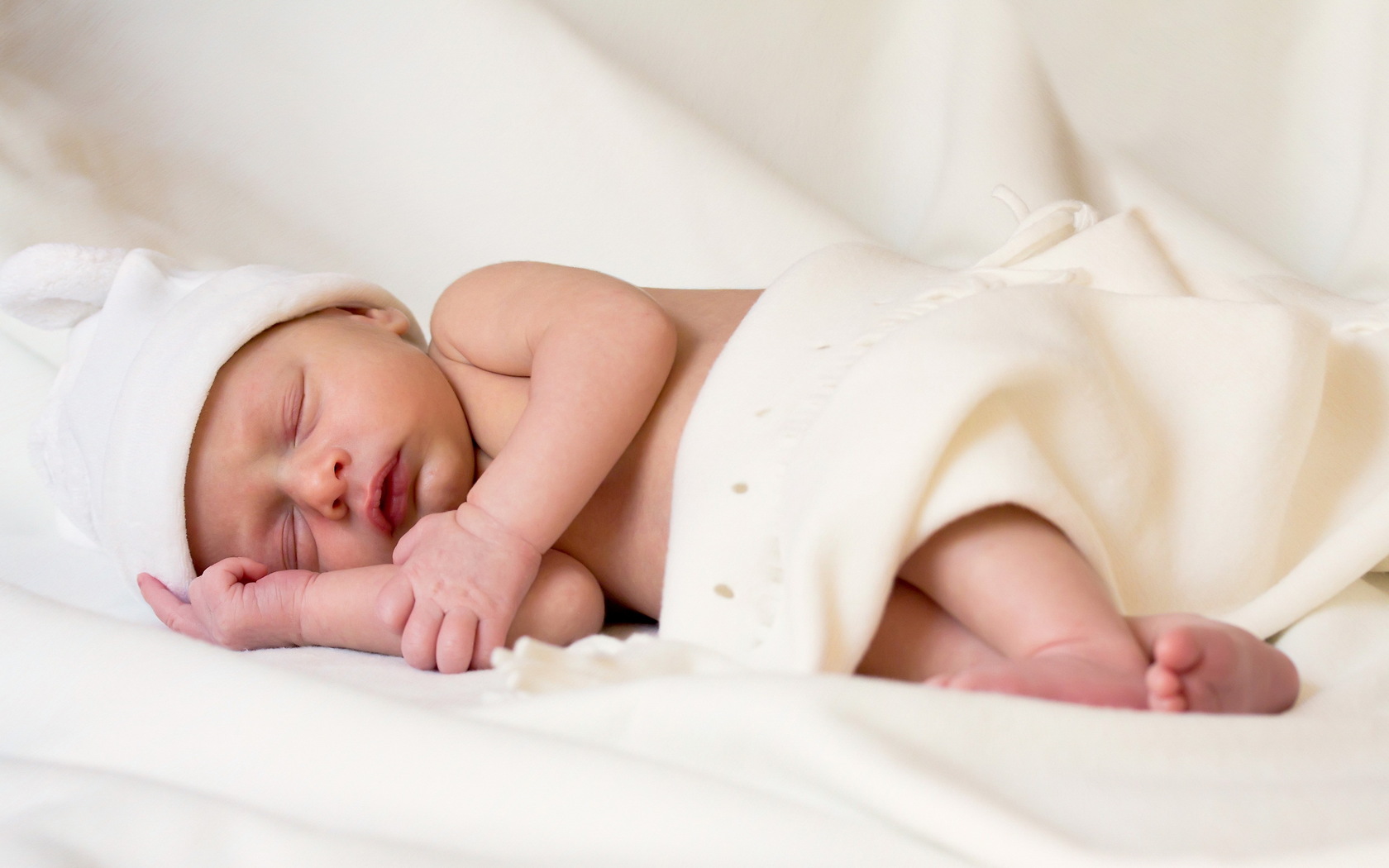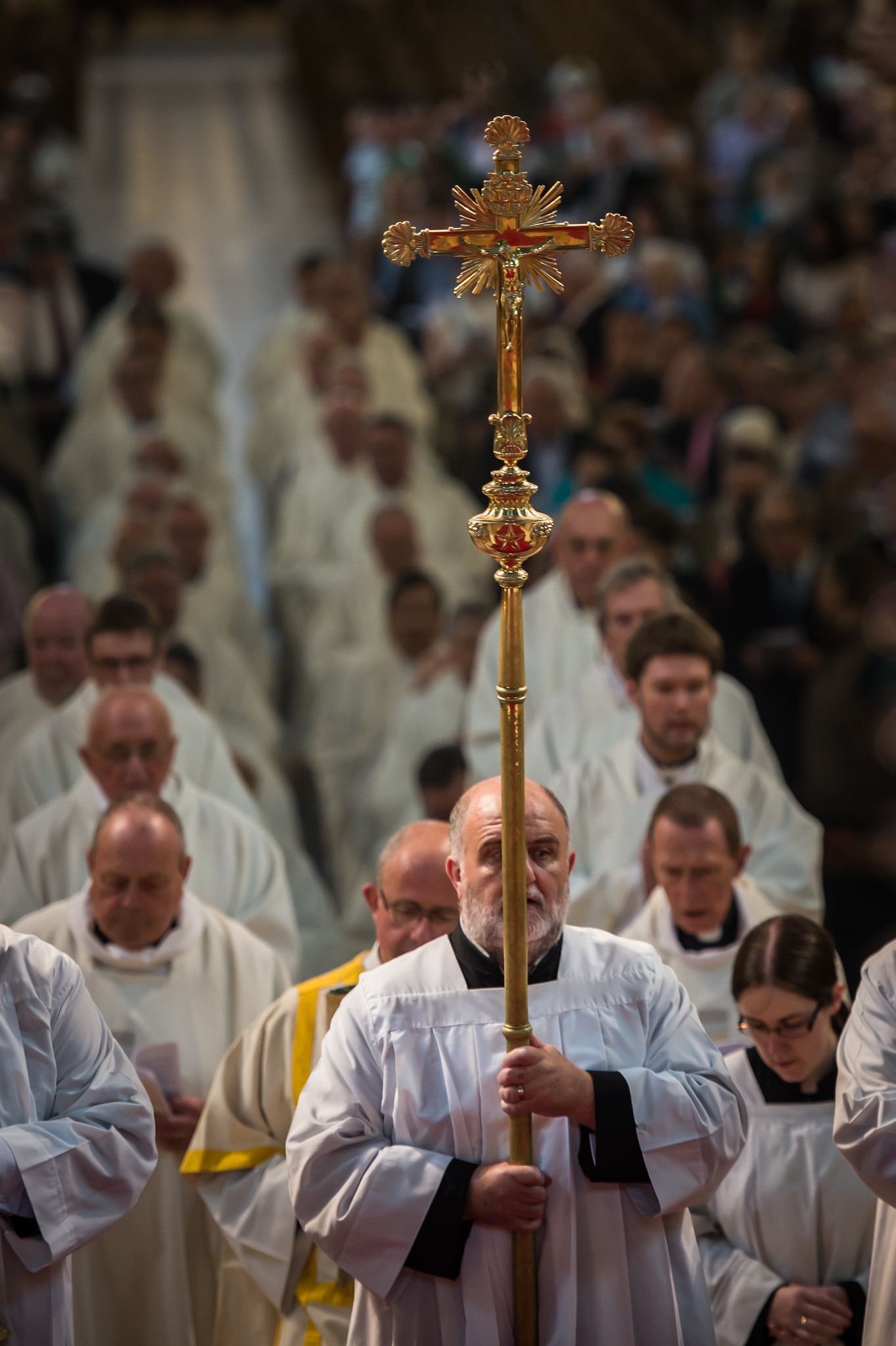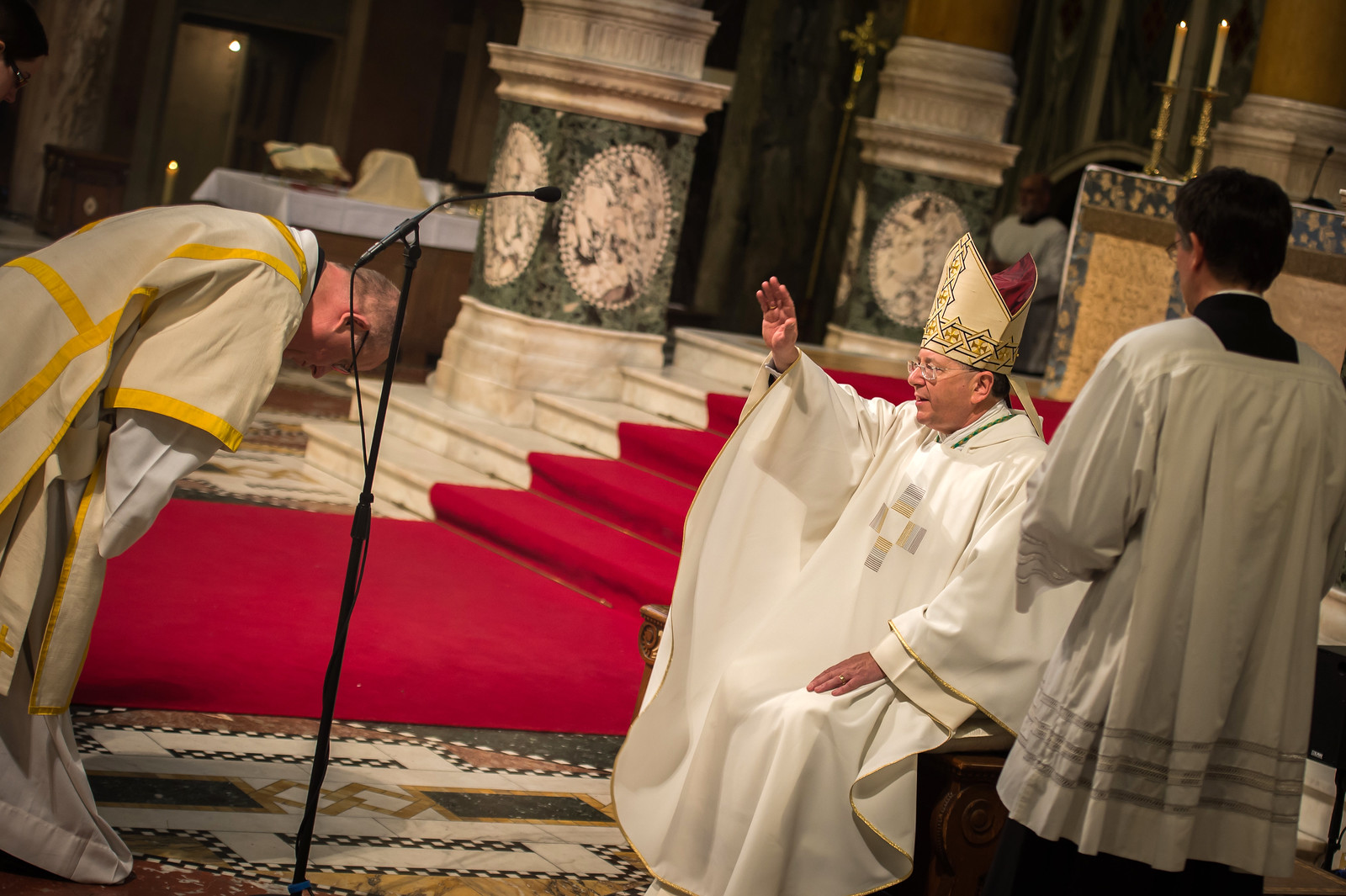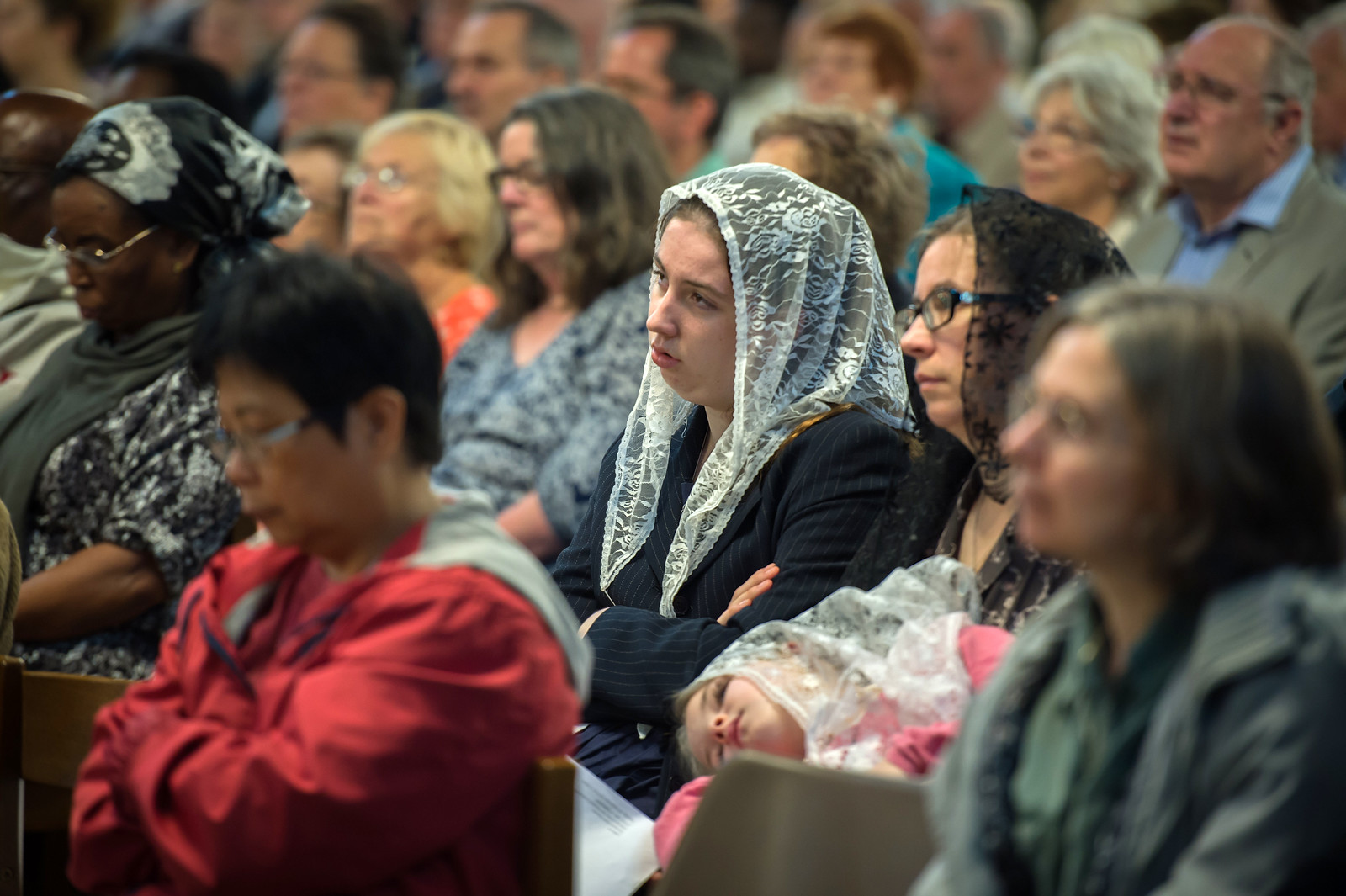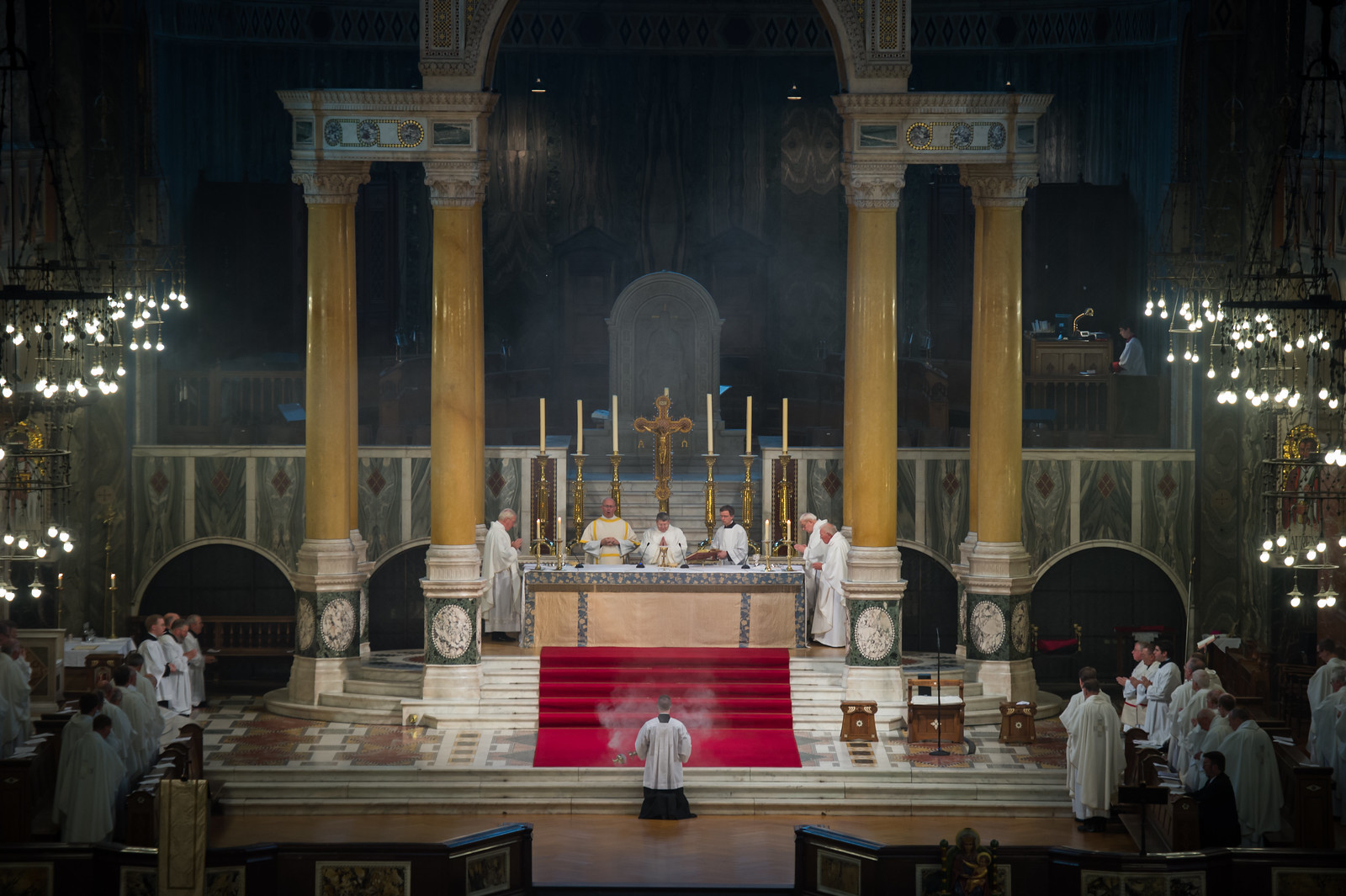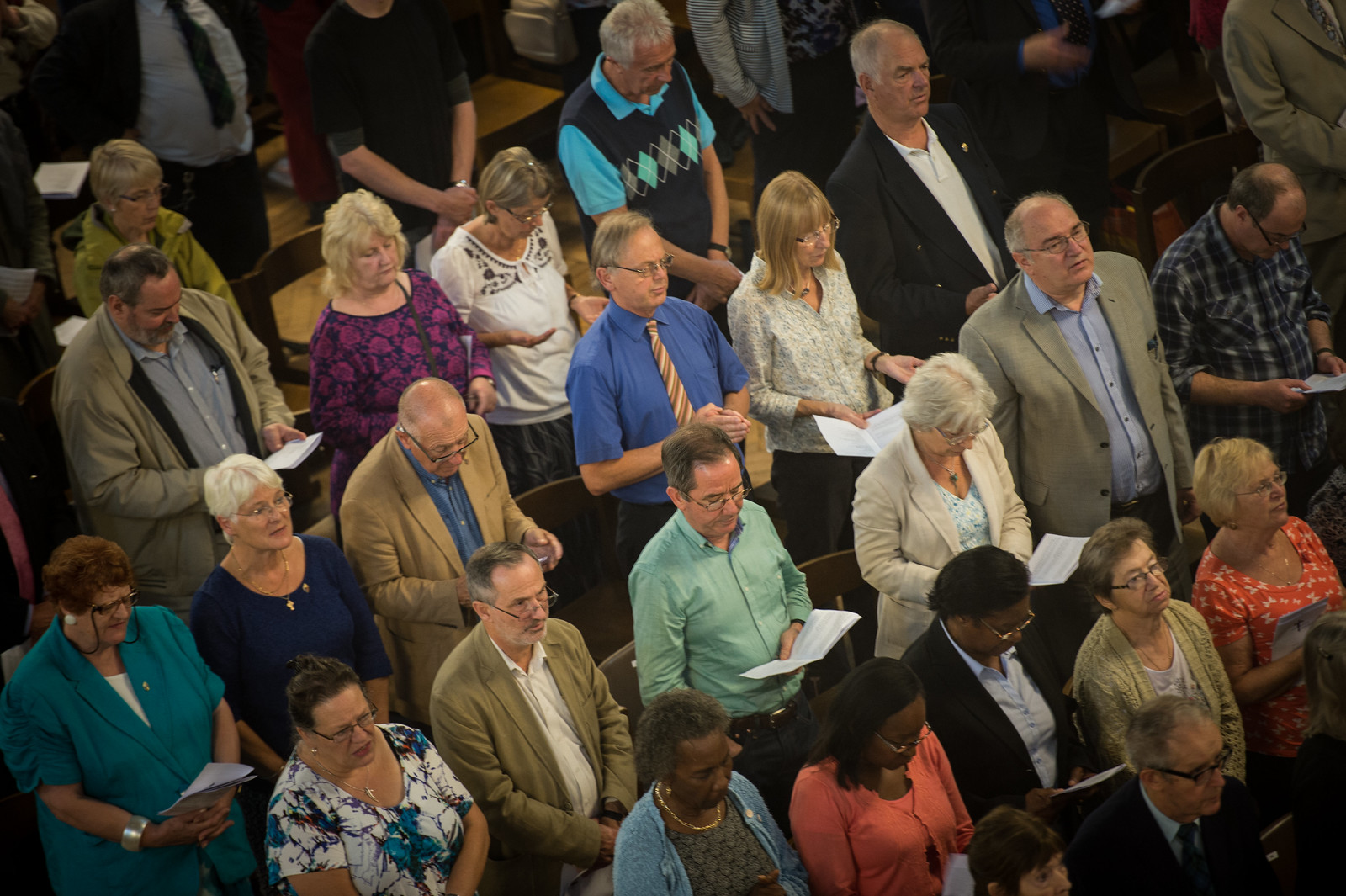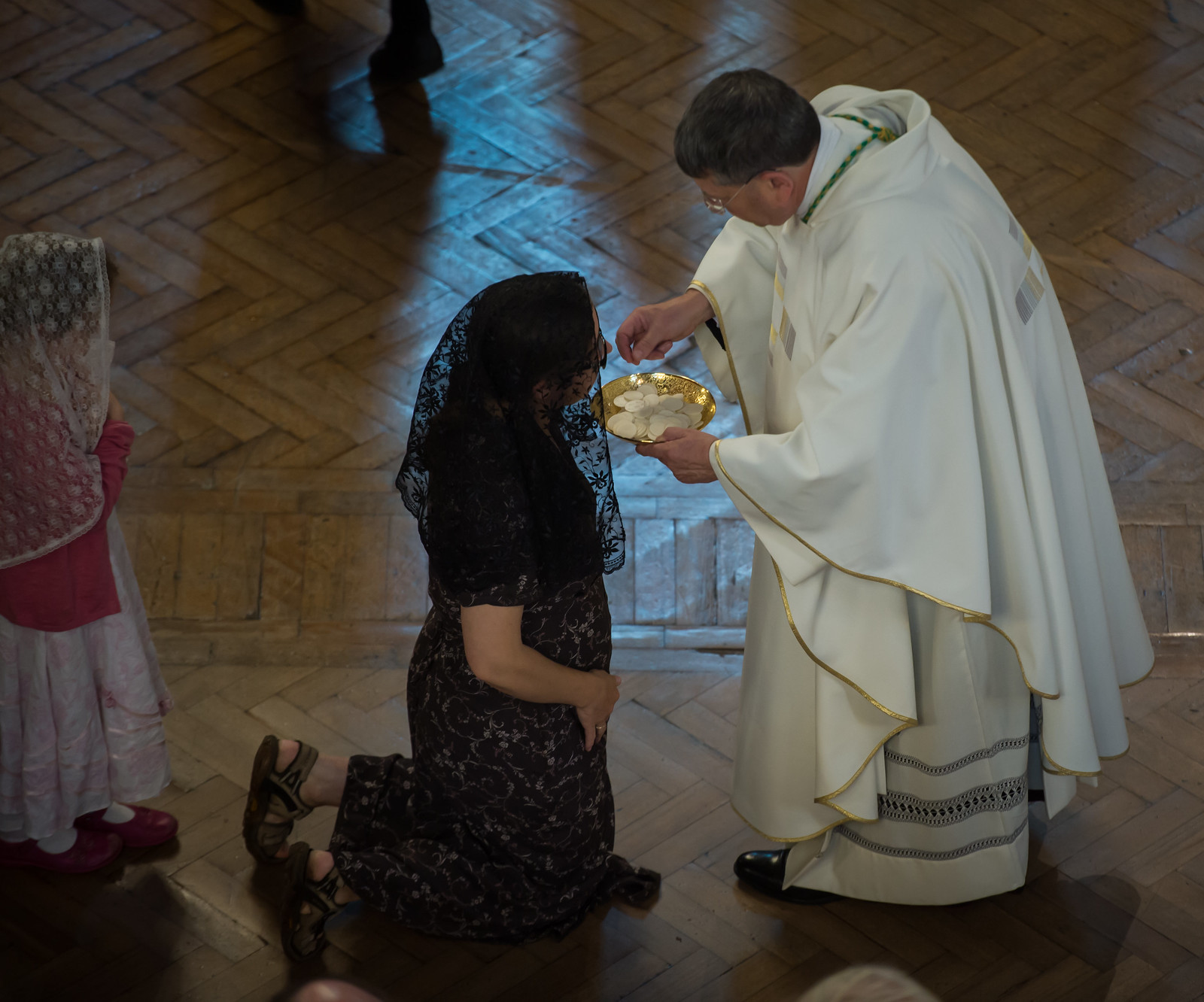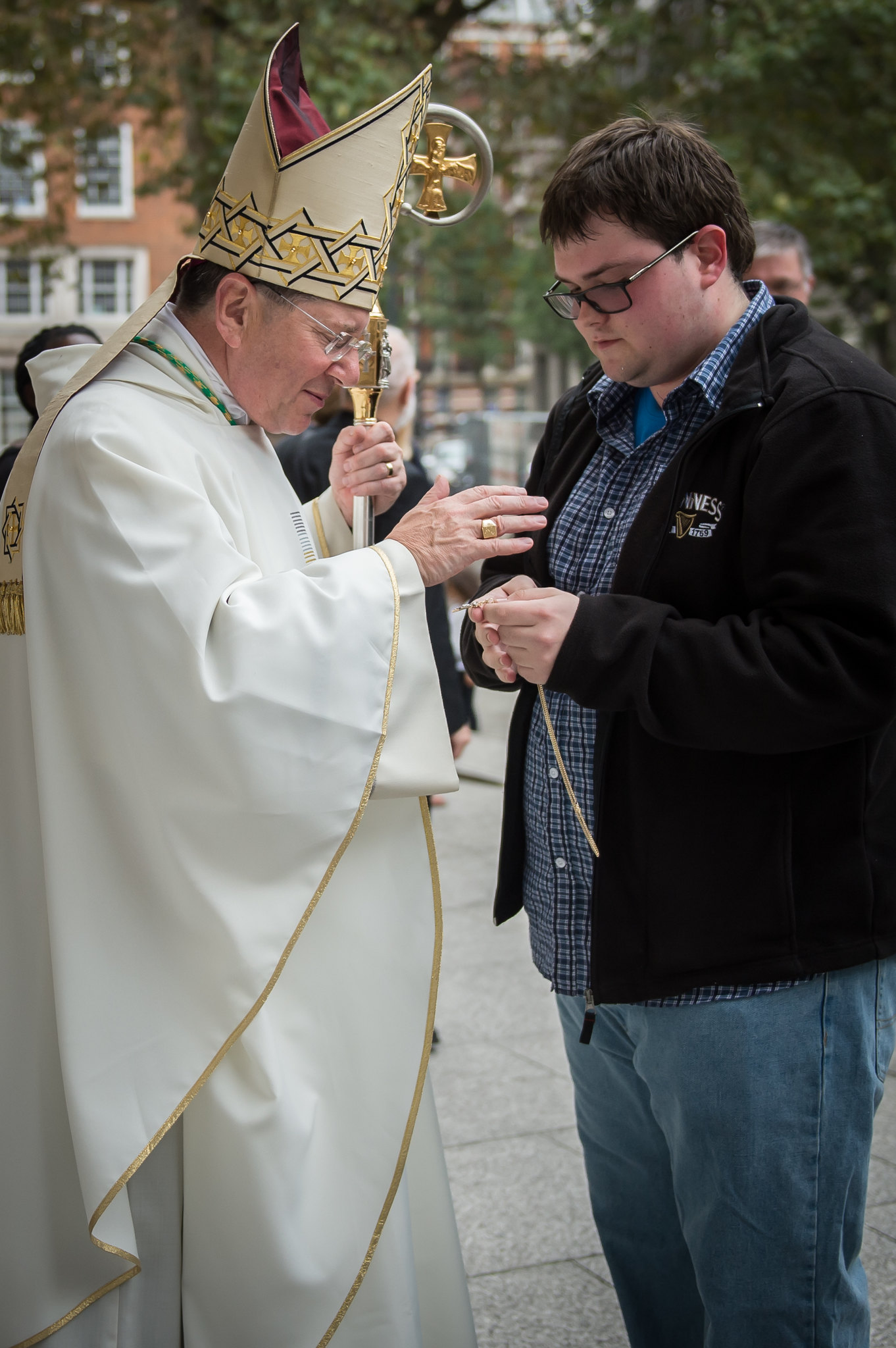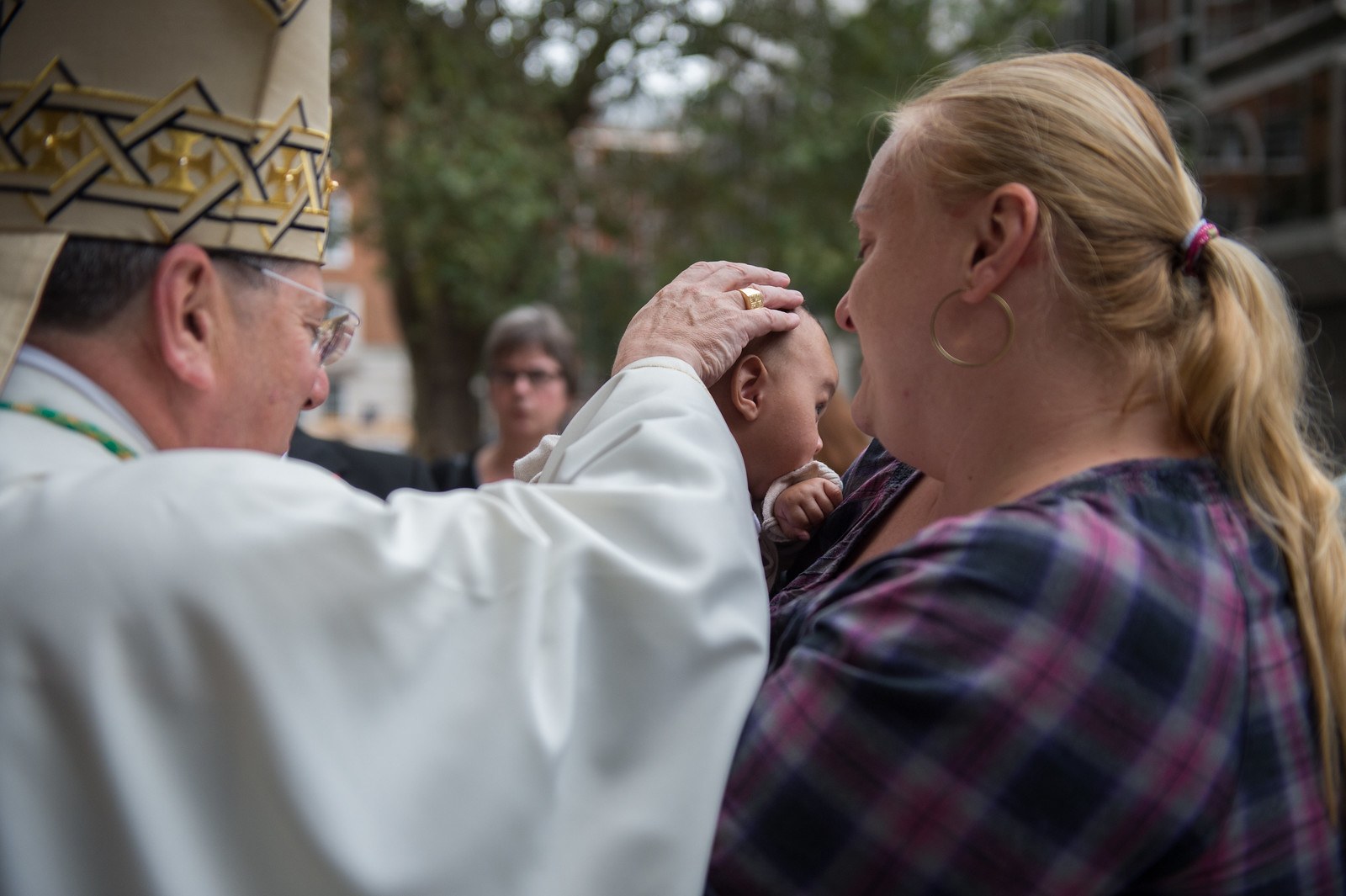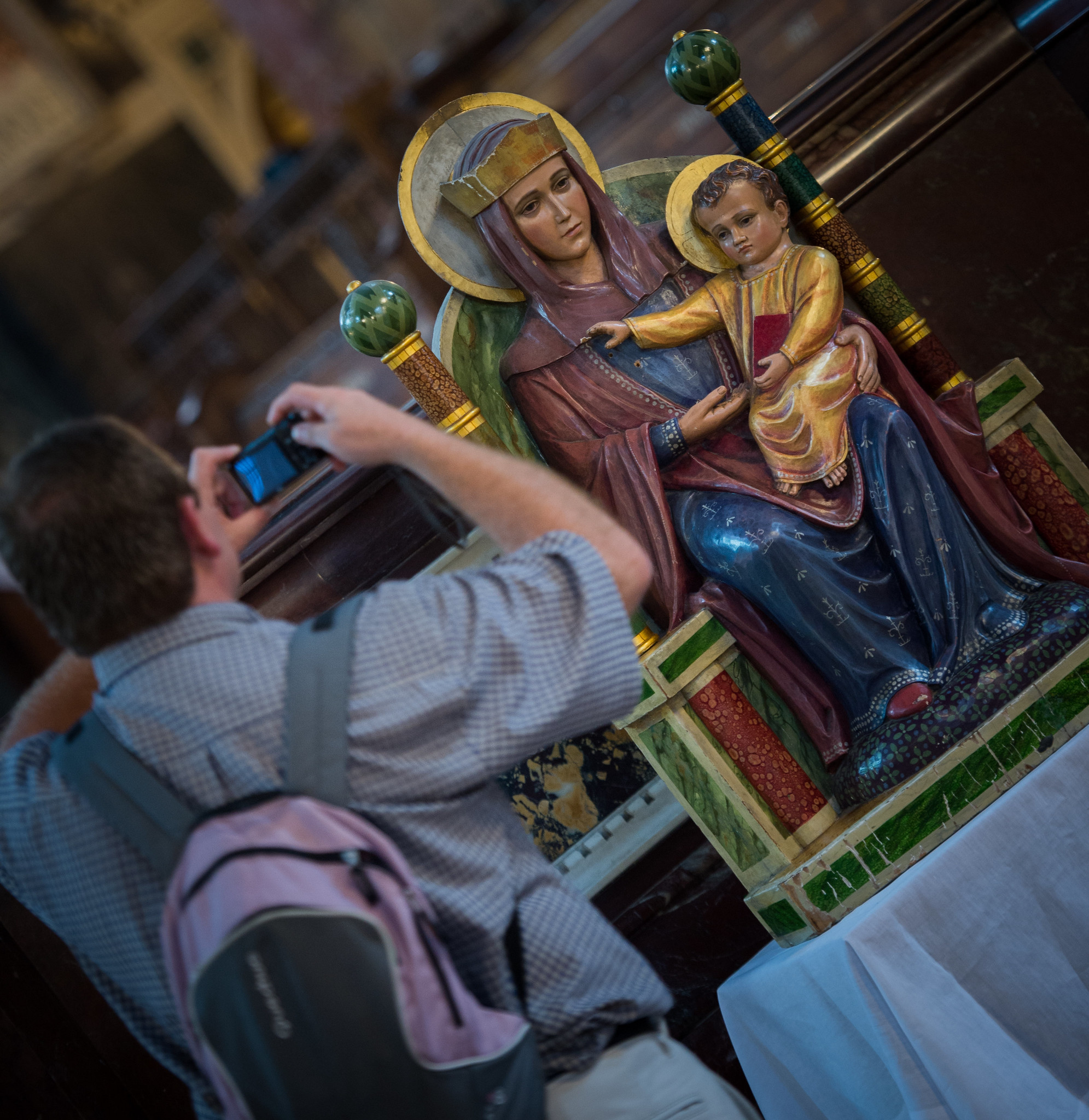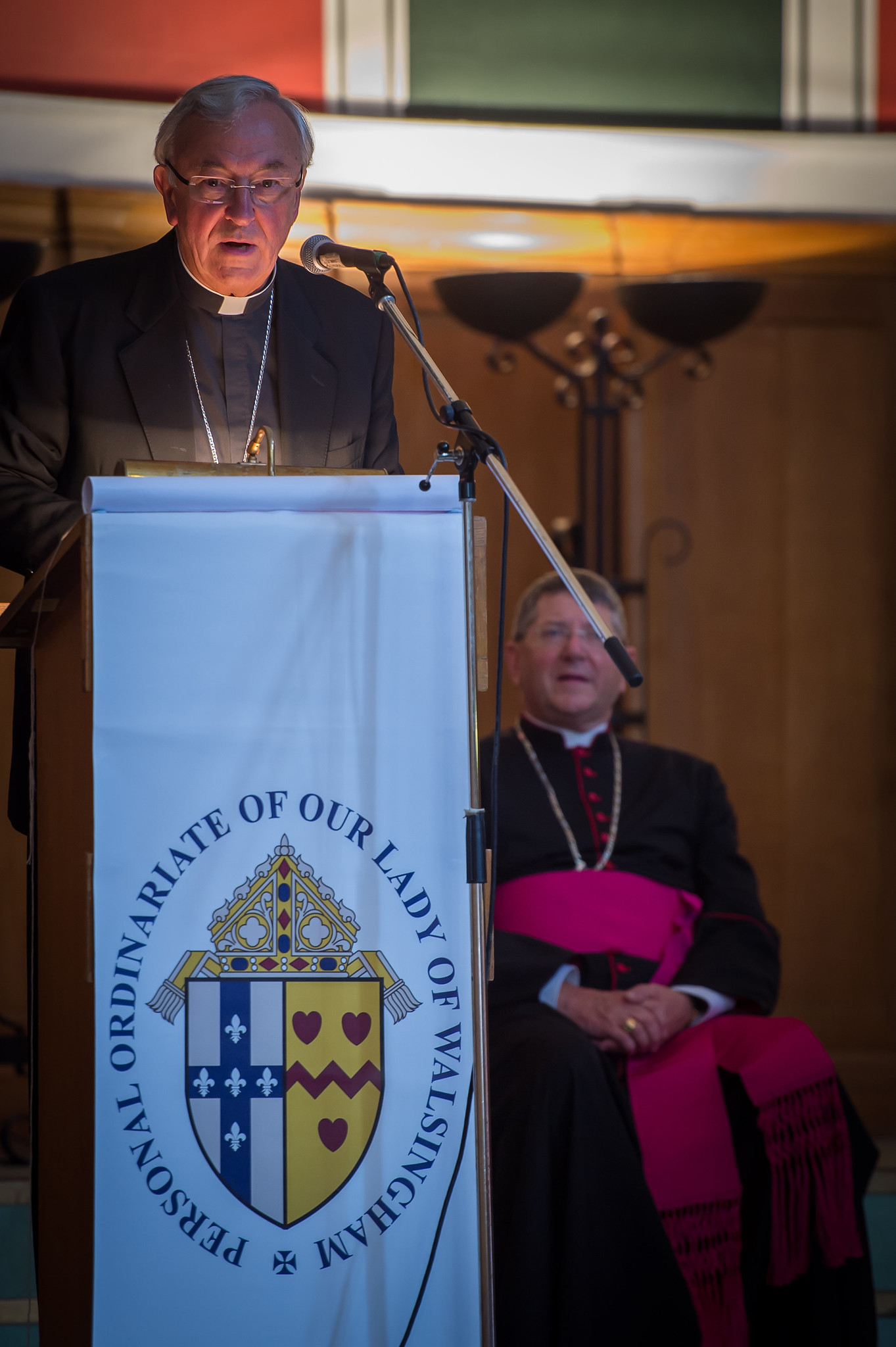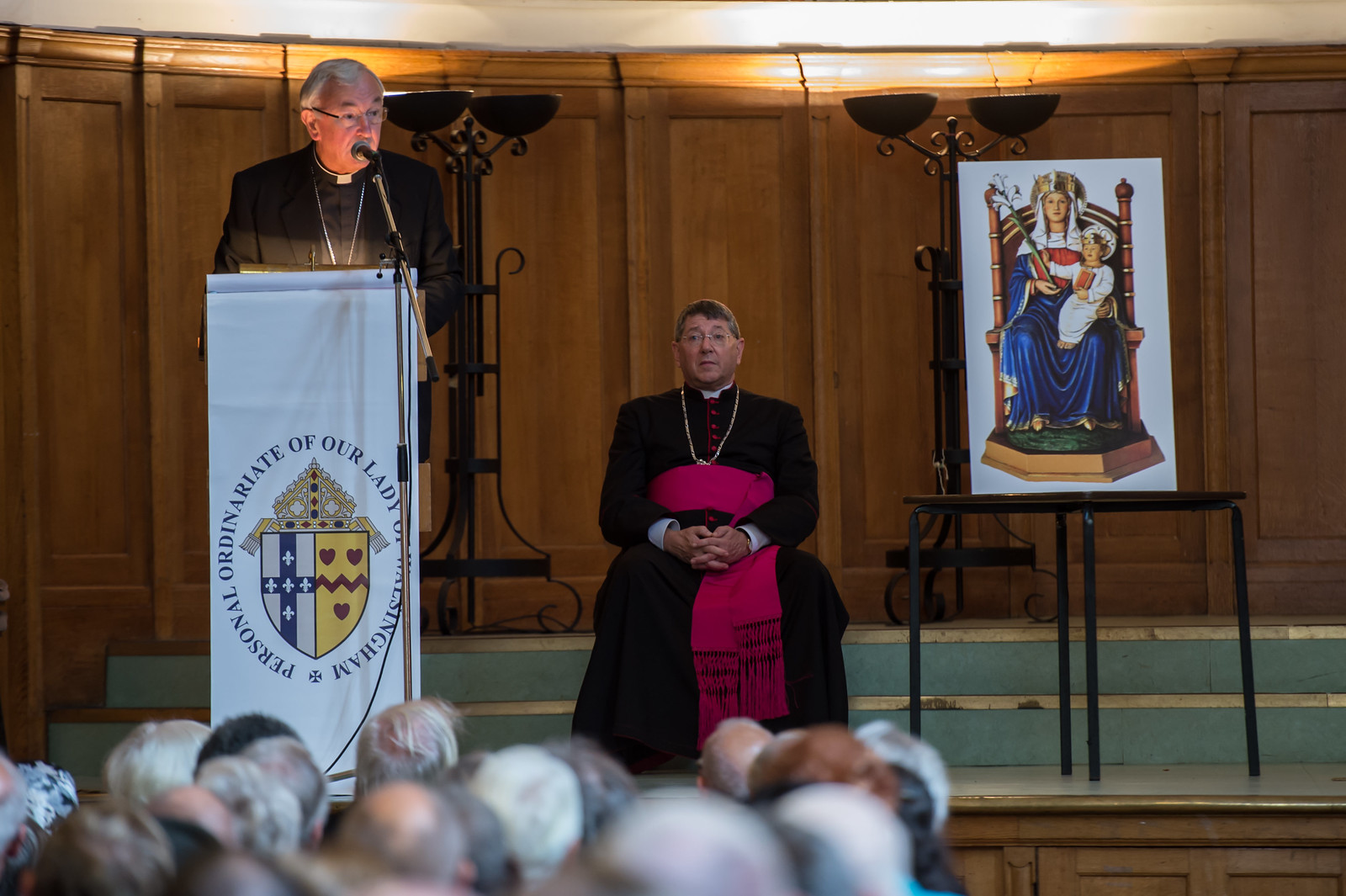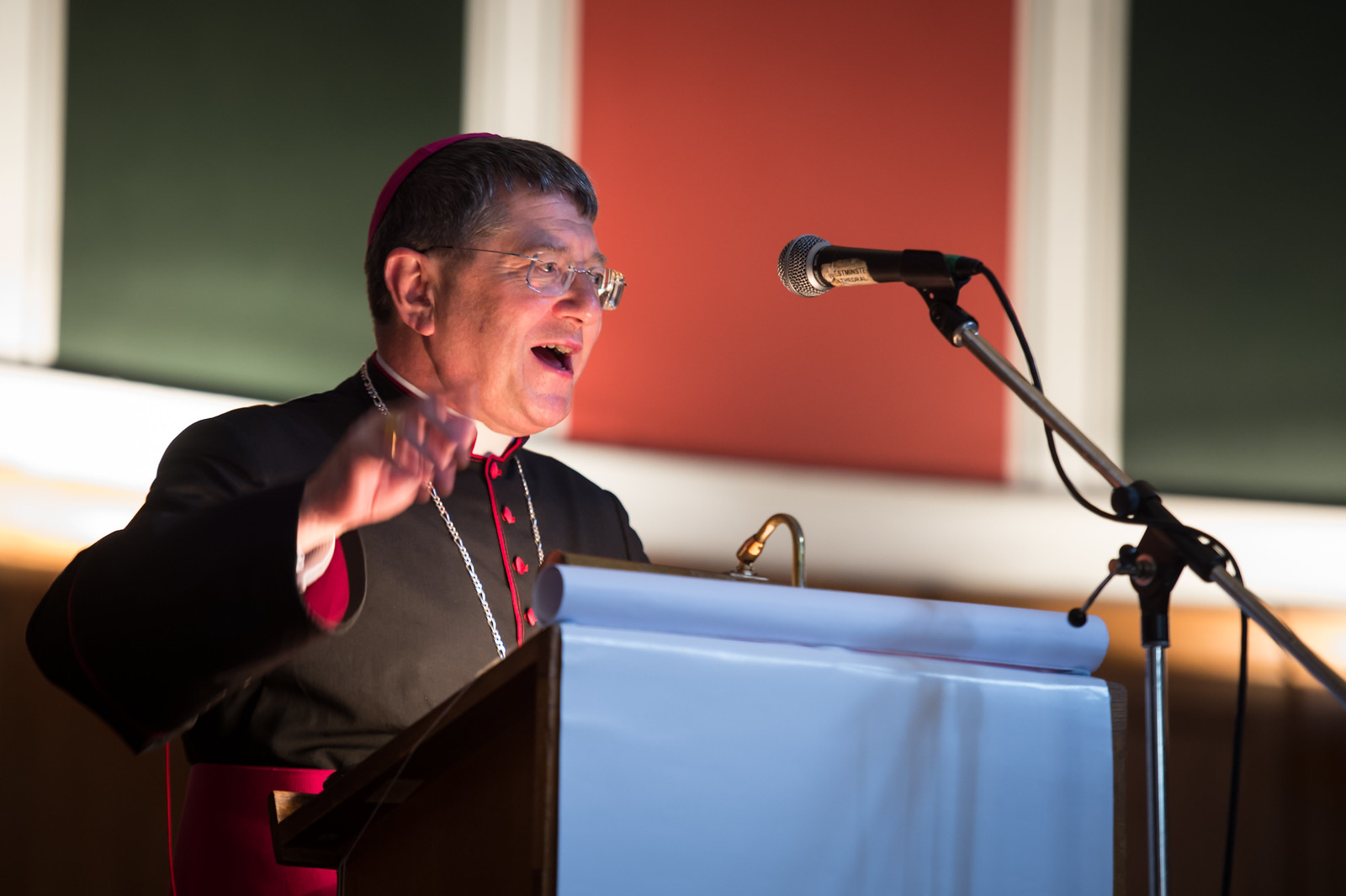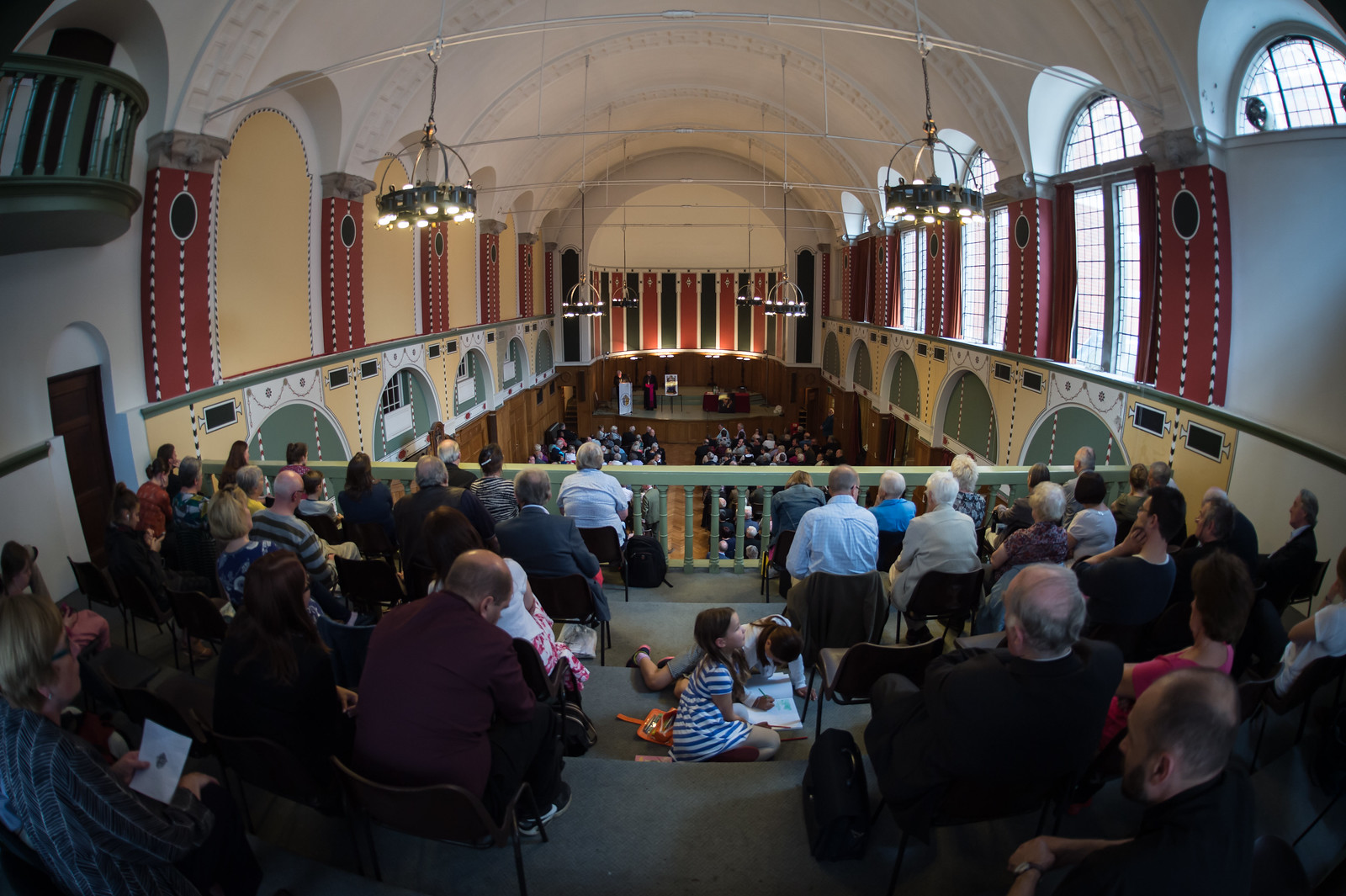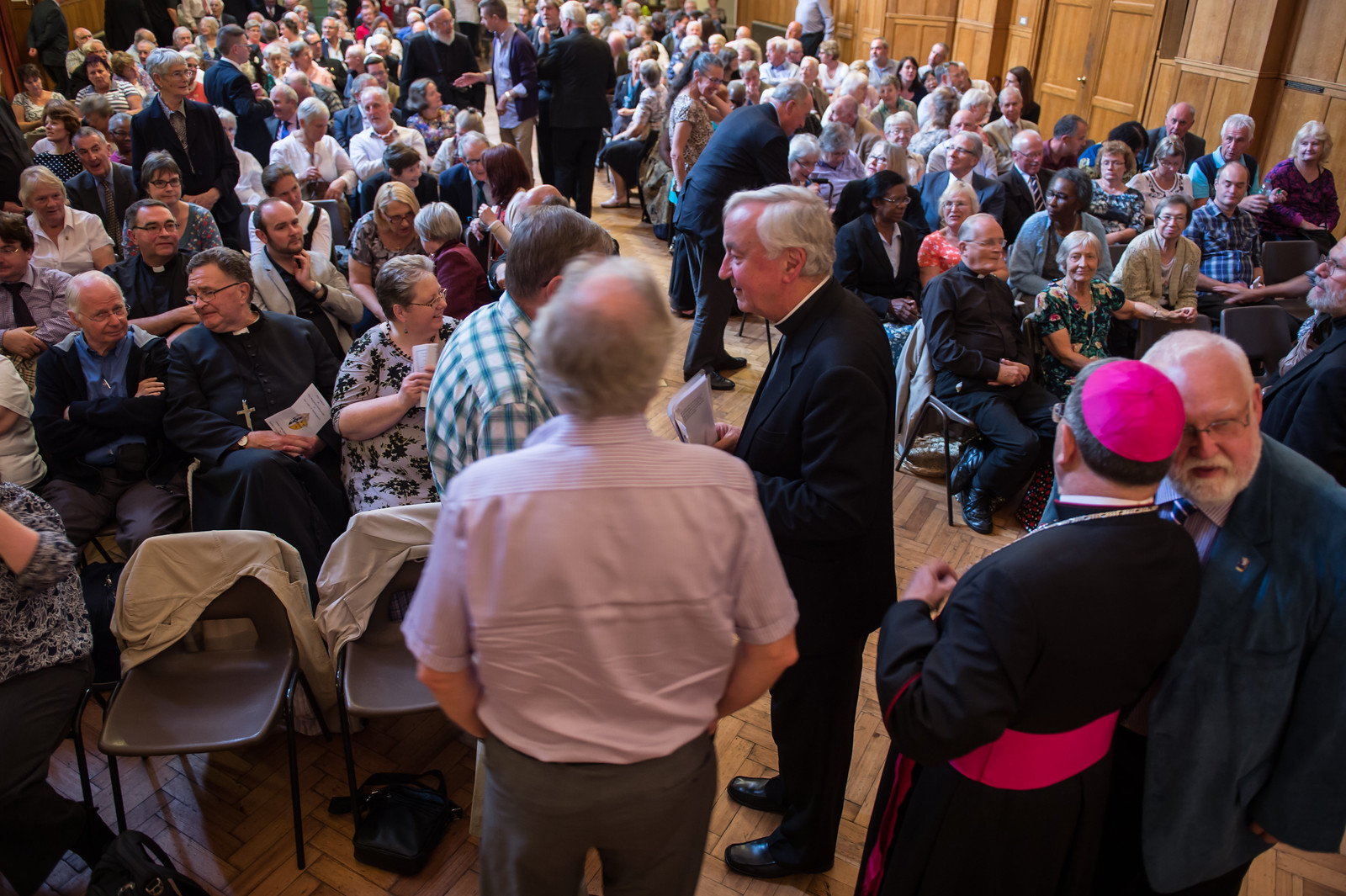A blog of the Ordinariate Groups found in Devon and Cornwall: Torbay, St Austell and Buckfast.
Saturday 27 December 2014
Christmas Masses
The Ordinariate in the Southwest wish all our readers and supporters a blessed and joyful Christmas Octave.
Buckfast Ordinariate Mission will be joining the community at their 10.30am Mass on the Feast of the Holy Family, and therefore there will be no afternoon mass.
On Sunday 4th January, the Mass will be at 3pm as usual.
Fr Ian
Friday 19 December 2014
The desert shall bloom
 |
| The desert in bloom |
While listening to the Gospel (Lk 1:5-25) and also the first
reading at Mass today (Judges 13:2-7,24-25), I do not think it is easy to not
be moved by the plight of both women, whom people called “barren”. It was a
terrible label for any woman. Fertility, the ability to bring forth life, has
been the essence of marriage in almost every society (excepting our own in the
modern west) and the inability to have children is a terrible burden for any
married couple. And this burden perhaps falls most heavily upon women who are
constantly reminded through their menstrual cycle of their capacity to nurture
life within their bodies. Women are created with the gift of being tabernacles
of new human life. (Incidentally this is why in Catholic churches women
traditionally wear veils. All holy tabernacles are veiled in a Catholic Church:
the tabernacle behind the altar, the chalice, statues of Our Lady and thus also
all God’s daughters.)
Infertility was seen in their time as a sign of God’s
disfavour, but Elizabeth and Monoah’s wife, we hear about in Mass today, are
not the only childless women in salvation history who are made fertile by God’s
intervention. There was Sarah, Rebekah, Rachel, and Hannah. Thus John’s birth
falls in line with that of Isaac, Jacob, Joseph, Samson, and Samuel, all of
whom were representatives of the Covenant between God and Israel.
And John was to be a Nazarite from birth. The practical consequences
of this were that being consecrated he could not drink alcohol nor have his
hair cut. In many ways Nazarites were like Old Testament monks and nuns.
Nazarites could take lifelong or temporary consecration. John was to be a
Nazarite from birth and for his whole life. Nazarites could also be priests or
members of the laity.
The conception of John in a womb called “barren” also
symbolised his vocation as a desert prophet. For from the barren wilderness
would come forth a prophet proclaiming a message to prepare for the coming of
He who is the Life. Indeed the desert would blossom and bring forth truth,
beauty and goodness.
There is barrenness in all our lives. There are aspects of
all our lives I expect that are not bearing fruit, what should we do about them?
Like those courageous women of faith in salvation history we need to bring our
barrenness to God with all the faith we can muster and ask the Lord to make our
lives fruitful according to His Will. Perhaps we do not see how they can be
made fertile but God does not see things as we do!
Fr Ian
Thursday 18 December 2014
A great joy, actually!
Over the years I have come across a number of people who
state their opposition to the reality of sin. When I served as an Anglican
clergyman various parishioners said that they didn’t believe in sin. When asked
to explain this, they said that “sin” was so negative and that talking about
sin just made everyone sad. When pushed further they agreed that this meant
there was no real need for salvation, and that they believed everyone went to
heaven.*
Resigning from the Church of England and entering the full
communion of the Catholic Church was motivated not least by the lack of
consistency in doctrine in the C of E and so being received into the Catholic
Church, I accepted joyfully its Magisterium (teaching authority). Yet I have
come to discover a similar problem in the Catholic Church! Many Catholics do
not believe sin is 'as bad as all that'. Many do not really think there is mortal
sin, or sin that is unto death. One reason why almost everyone who goes to Mass
receives the Blessed Sacrament is because many don’t really believe in mortal
sin. They just think God is a nice chap and of course He wants us to receive “communion”,
no matter what state our soul is in. This diminishing of sin in people’s minds
is extremely dangerous and is of course exactly what the Enemy wants us to
think.
If we want to know how dangerous sin is we simply need to
consider the Incarnation and today’s gospel reading (Matt 1:18-24). The Angel said
to Joseph in a dream, “You shall call his name, Jesus, for he will save his
people from their sins.” The very reason for the Incarnation, the reason that
God became man, is because of sin. Out of His great merciful love, God desires
to save us from our sins, and in order to do so, condescended to become Man. In
the Blessed and Immaculate Mary the divine and human nature were united in this
child, who was to be called Joshua,
or Jesus. His name means ‘God saves’, which is not only His mission but also
His identity.
Why on earth would God become man if sin were not serious?
Why would God condescend to unite Himself with our human nature, if sin were ‘not
that bad’ or ‘did not exist’?
The truth is sin is deadly. Sin causes disintegration. Sin
causes disintegration between our relationship with God, between our
relationships with fellow human beings, between our relationship with the whole
of Creation, and even the relationship between our body and spirit. Sin
is a comprehensive disaster! There is nothing else that does such a
comprehensive and damaging job as sin!
By saying this I am not being negative! By saying this, the
Church’s magisterium is not being negative! By saying this Christ is not being
negative! The first words of Christ’s first sermon was “Repent and believe!”
This was the proclamation of Christ after His Baptism, at the beginning of His
public ministry. And Christ went all the way to Calvary to definitively and completely deal
with sin.
Sin is immensely serious and comprehensively disastrous, but
we have the Good News that Christ has completely and entirely dealt with our
sin, and so His grace is sufficient for us to deal with sin in our lives. Christ has
given His Church the authority to absolve sin, especially mortal sin. “Those
who sins you forgive, they are forgiven…”, He said to the Apostles on Easter
Day.
We need to take sin immensely seriously but taking it
seriously does not mean wallowing in it or just being miserable, it means
dealing with it. So let us all repent, get ourselves off to confession, and let
us all have our sin dealt with by the grace of Christ in the Church. Dealing
with sin through the grace of Christ is actually a great joy!
Fr Ian
*Not everyone in the C of E thinks like this, there are many
good Christians who do believe in salvation from sin, but for me there were too
many who thought that this way of thinking was entirely compatible with
membership of the Anglican church.
Wednesday 17 December 2014
A long list
When I was a country Rector in the Church of England I would
receive from time to time requests for information from our parish registers. Serving
traditional country parishes, the parishes were reluctant to part with their
ancient registers into the central diocesan archive, so it was not uncommon for
me to receive a request for a register search. Although they didn't always
arrive at convenient moments, in a way I quite enjoyed dusting off the old
registers and peering through their crisp pages. I was often struck by the beautiful
handwriting of all entries before the 1950’s and how the hand-writing went
downhill from there! But I was also struck how in the 19th and 18th
century so many entries contained signatures consisting of an X and alongside
the Rector’s annotation “the mark of…” For some people the researching of their
genealogy is very important to them.
Clearly for Matthew the genealogy of Jesus Christ is very
important. Today we hear the long list of names read out at mass (Matt 1:1-17).
We might think it a little boring. We might think there is nothing of
inspiration in today’s gospel. But we need to ask ourselves, “Why?” None of us
would miss these 17 verses if Matthew hadn't included them. Well the point is
that although we might not, Matthew’s
original hearers/readers did appreciate it. Matthew is establishing Jesus’ kingly
messianic credentials as he effectively states in verse 1: “The book of the
genealogy of Jesus Christ, the son of David, the son of Abraham.” He is
establishing that Jesus is in fact of the line of Abraham and of the line of
King David. God promised long before
that “kings” would stem from Abraham’s line (Gen 17:6) and later promised, in a
covenant oath, that David would always have a dynastic heir (2 Sam 7:16; Ps
89:3-4).
Matthew establishes for us Jesus’ earthly credentials while
not undermining His divinity. Jesus is of course not the biological son of
Joseph, but Joseph does accept Jesus into his family lineage. Matthew reminds
us of this at the end when he says, “and Jacob the father of Joseph the husband
of Mary, of whom Jesus was born, who is called Christ.” Despite the long list
of “the father of”, now at the end Matthew is preparing to reveal that Jesus
was miraculously born of the Virgin Mary, without the contribution of an
earthly father, but instead the Holy Spirit.
One final comment on this genealogy is to say that the
gospel here is ensuring we understand that Jesus is human as well as divine. It
doesn’t use that sort of language, but by establishing Jesus human ancestry we
can be in no doubt that His divinity did not exclude His human nature received
from Mary and he was part of an earthly family. This is the wonder of the Incarnation, which in this last week
before the great and solemn feast, we contemplate. God’s plan for the salvation
of mankind was worked out through the lives of real human beings. This is not
just for the past, but even now God has a part for us to play, in His great
plan.
Fr Ian
Tuesday 16 December 2014
Sentiments towards God do not last - our promises do!
The gospel for today really follows on from yesterday’s
gospel when chief priest and elders are questioned by Jesus regarding John the
Baptist’s authority. They could not answer Jesus out of fear. So the parable of
the Two Sons answers them indirectly.
The sons represent two groups of people. In the context of
the gospel they are sinners who repent, and Israel’s leaders who refuse the
Baptist’s message (even when tax-collectors and harlots do!).
So the son that initially says “no” to his father, but later
thinks better and actually does what the father wants him to do, are the
sinners who repent. The other son who initially says “yes” to his father, but
does not actually do what his father wants, are the chief priests and elders.
They talk a good game, but they do not actually live it out.
All of us for whom our faith is very important need to be
reminded of this teaching of Jesus. It is easy to say “yes” and not follow
through, especially if we get caught up in a sentiment towards God. Then we
might promise all sorts of things; whereas sentiments do not last, our promises
to God do. Following through on our promises is hard work and we do not usually
have the motivation of warm feelings all the time, yet it is of utmost
importance lest we find that we actually deserve the title hypocrite!
Fr Ian
Monday 15 December 2014
Rejoice - repentance then joy
Gaudate
Sunday
is the Sunday in Advent we think about rejoicing and about joy. But why do we
have a day which has the theme of rejoicing during a season of the Church which
is a penitential season – a season
about making paths straight, about repentance, about turning away from sinful
habits in order to be prepared to welcome the Messiah. It seems a
contradiction. Surely Advent is a season of mourning, of weeping, of being sad?
However this is a mistaken way of thinking. It is in
fact the way in which the modern secular world regards religion. The modern
secular world regards religion to be about restricting freedom, about rules,
about being strict, about being uptight, about not doing what you want to do.
Sound familiar?
But we really need to wake up to the fact that this
is a lie. It is a convenient lie that justifies people in ignoring religion,
and not least Christianity.
We have been exploring this particularly in the
course I started recently on Theology of the Body, at the chaplaincy. What this
course engages with is that of the Church’s teaching on sexual morality,
chastity and marriage. And one couldn’t pick an area of church teaching that is
more misunderstood and misrepresented and hated than Catholic sexual ethics!
People truly believe that the Church’s teaching is all about rules of “do not
do this…do not do that…” Theology of the Body is not like that however, it
views the teaching of the Church first of all from the standpoint of love, and
it reveals the Church’s teaching as Good News.
In Theology of the Body we learn why the Church teaches what she teaches
and why it is Good News. And it is a joyful revelation; and a revelation that truly sets us free. We’ve also
discovered how miserable the world’s approach to sex makes people, and that
they really need this Good News; in other words it has made us want to be
evangelists of this Theology!
But this isn’t restricted to this area of Church
teaching alone. This is generally true of the whole Christian message.
Now this is partly our fault! And it is the fault of
recent generations of believers!
People of faith have been too content to reduce
their faith to a set of rules. And they have not taken the trouble to find out
why the Church teaches what she does. And this is one of the reasons why
Christianity has been waning in Europe and North America. People do not respond
to rules – rules do not give joy, and they do not communicate Good News!
Rules do have some advantages, and of course we do
need rules to keep order and to give us a sense of being together in a
community. But they are also in a sense easy – easy to understand. It does not
take too much effort to understand a rule. It is usually simple and
straightforward. Take the obligation to go to mass on every Sunday for example.
It is easy to understand – there is just the question to obey it or not. But if
we choose to be obedient (which we know we ought to be) then it doesn’t require
any more studying of our faith to comprehend it. Yet there is a reason for the
obligation. The Church does not require Sunday Mass attendance arbitrarily. It
is in fact good news! The Church, as a good mother, calls all her children
together on the Lord’s Day because the Lord wishes to bestow upon us His
enormous and generous grace, to enable us to be truly liberated and healed from
the misery, sadness and darkness of the world in which we live. It is the
Lord’s Day and when we give ourselves to Him in true worship, He gives back far
more than what we give Him. He transforms us. It is His design that makes every
Sunday His day to offer this to us, and in doing so to transform every other
day of the week, and the whole of our lives. Sunday mass is really good news!
But it requires much from us!! And the truth is we are lazy, and we are
grudging in what we want to give God.
Returning to the theme of Advent then, and the
exhortation of John the Baptist to repent, we think of it in wholly negative
terms. We think that that sounds miserable, that sounds as though it will make
me sad. If I spend time examining myself, spend time thinking about my sins,
then it will just make me a negative person and very sad; what we convince
ourselves to think is that really we need to stop being so negative and start
being a jolly person. So we paper over our sin, we forget about it, we leave it
alone, we think that we know we’re not perfect but ‘no one is are they?’ We
forget repentance and we ignore our sin. And we try to give ourselves a veneer
of happiness – ‘we are free from that negativity, and now we can be happy.’ But
the truth is that we are not really very happy at all! Below the surface of
superficial jollity we experience misery and sadness.
We can see this in the modern western world we live
in. Where is the joy? There is entertainment which is fleeting happiness, but
when it is gone we feel even emptier inside!
And the reason for all this is that we have not
dealt with the root causes of our problem. The root causes of our problem is
within us, and is indeed our sin. That is why when God became Man, when God
condescended to become a human being, He was called “Jesus” because “He will
save us from our sins.” It is at the very heart of our faith, that the source
of our problems is sin.
The Good News is repentance! Repentance is good news
because we can actually deal with the problem of sin and really get rid of it!
That is what the grace of Christ does for us. But it doesn’t happen without
some effort on our part. We must be bothered, we must make the effort, we must
not paper over our sin, we must look at it, confess it with sorrow, but then
open ourselves to receive forgiveness and healing. And so repentance is good
news not least because it gives us joy. Because when we empty ourselves of sin
through the gift of Christ, we make room for Christ Himself to dwell within us.
And if Christ dwells in us we are truly free, we are truly at peace, we are
truly happy. Nothing in all creation can give us real and lasting happiness and
joy and peace. Only God can do that, only God in Christ by the Holy Spirit can
do that for us. This is the truth. This is the Good News! And it is joyful!
Believe in it, my brothers and sisters. The world lies to us when it says
dealing with your sin will only make you negative. There are tears on the way
but they become tears of joy and happiness, and if we have real peace in our
hearts – no one will be able to take that away from us.
So we keep Advent as a season of penitential
preparation for Christmas not because we need to punish ourselves a bit before
having a jolly festival! Advent reminds us that in order to have real deep and
lasting joying we need to repent, and clear out our sin, in order to make room
for God Himself, Emmanuel, to dwell within us. That, my brothers and sisters,
is truly worth rejoicing about, truly what Gaudete
Sunday is for – so now what about doing something about it?
IH
Friday 12 December 2014
Excuses...
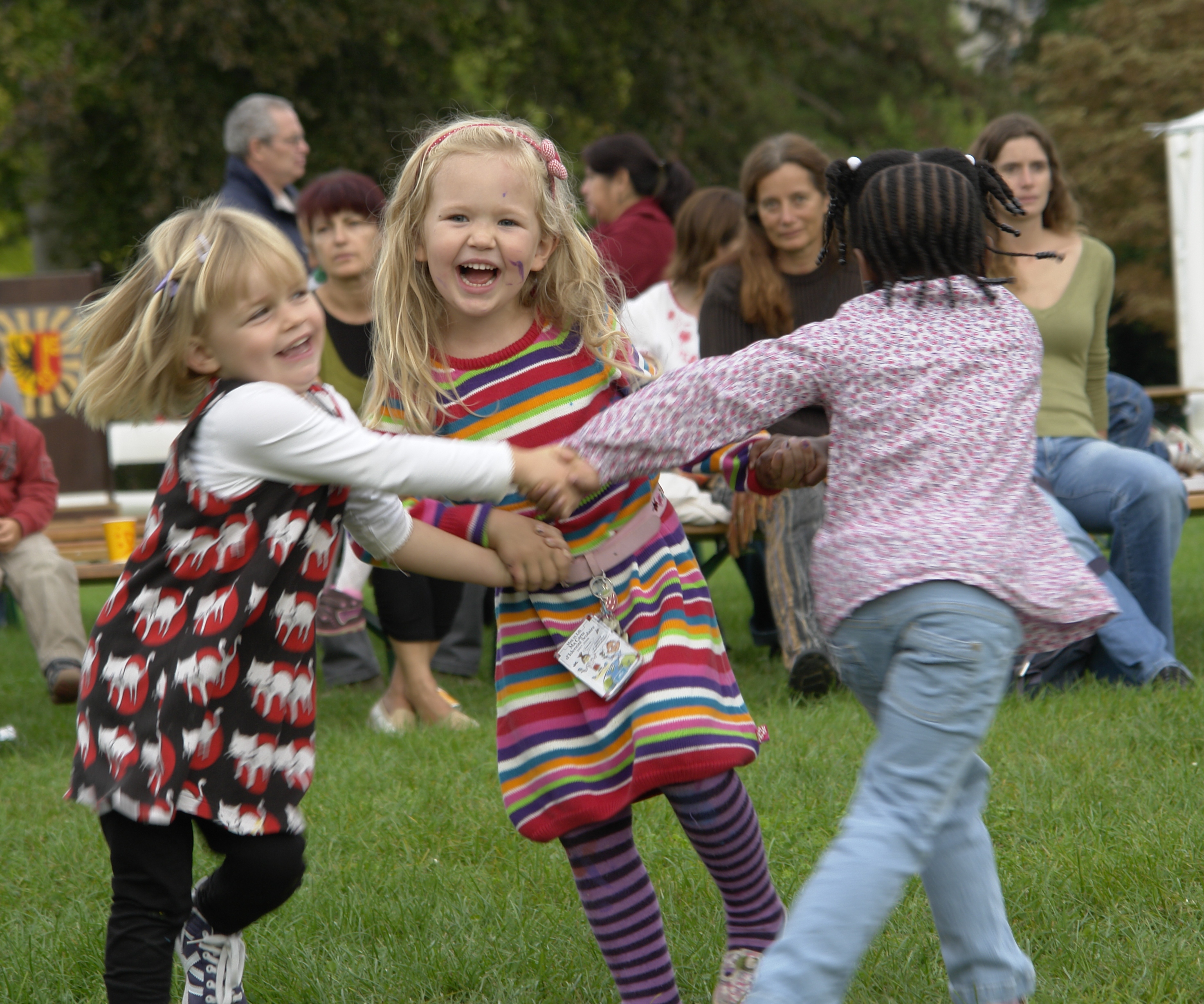 |
| Children dancing |
There are always excuses to not do what we know we ought to
do; not least when we hear the still small voice of God and refuse to respond to His invitation. In the Gospel reading for today (Matthew 11:16-19) Jesus exposes
such excuses. He uses a song of children:
We piped to you, and you did not dance; we wailed, and you did not mourn.
The piping refers to a wedding, of dancing and music, which
is alluding to Christ’s own ministry. The wailing refers to a funeral where
there is public mourning and wailing, which is alluding to St John the Baptist’s
ministry.
Jesus’ contemporaries refused to heed the call of John to repent
of their sins, to mourn because of their disobedience, self-centredness and
waywardness. They also refused to respond to Jesus’ call to celebrate the
presence of the Bridegroom, the Messiah, and to learn how to love God and their
neighbour. They refuse invitations to embrace the Kingdom of God.
How often do we make excuses to not hear God’s call? How
often do we tell ourselves, I haven’t sinned that badly, I don’t need to pay
much attention to my sins and find ways of dealing with them? How often do we fail
to love God with our whole heart, mind and strength? How often do we give God
our second best, or third best – “oh that’ll do”? How often do we look on our
neighbour as someone who gets in the way, or someone to be used, or someone to ignore?
How often do we make such excuses and just carry on in our own way?
Fr Ian
Thursday 11 December 2014
Second conversion
 |
| Jose de Ribera - Repentance of St Peter |
Mt 11:11-15
Jesus greatly extolled the virtue of John the Baptist
saying, “of all the children born of women, a greater than John the Baptist has
never been seen…” John was called by God to be the last prophet that would
prepare for the coming Messiah. John exhorted people to repentance, to
conversion. The preparation needed was an inner change that would reject sin
and embrace belief in the promises of God. This call to conversion is an
essential part of the proclamation of the Kingdom, and Jesus exhorted people to
“repent, and believe in the gospel”.
Since I left the Church of England and entered the full
communion of the Catholic Church, many Catholics refer to me as a ‘convert’.
Although as Abbot David explained to us at our Reception, strictly speaking
converts are those who convert from one religion to another, or, from no
religion to faith. We were not changing our religion; we were being reconciled
with the Holy See. Our baptism was valid and good, and after accepting all the
Catholic Church proposes for our belief we were then entering into full
communion. That was helpful to all of us entering the Catholic Church because
it didn’t feel we were denying the good things of our life in the Church of
England but embracing a more complete Christian faith. It wasn’t a new faith
but it was fuller, more integrated and had a bigger vision than we had known as
Anglicans.
However, without contradicting what I had said about
converts, there is a sense in which all Christians are converts! Christ’s call
to conversion, as the Catechism says (CCC 1427-9), continues to be at play in
our lives. The major conversion is our baptism. The ongoing conversion of our
lives according to the gospel is what the catechism calls the second conversion. The whole Church is
about this and it is an ongoing purification throughout life, and if necessary
on into Purgatory. It is cooperation with the grace of Christ in His Church,
and most especially through the gift of the Sacrament of Penance.
St Peter, of course, is a very good example of this. For
though he had professed Jesus as His Lord and Saviour, and the Son of the Most
High, yet Peter denied his Master three times. After repenting with tears, he
went on to give a threefold affirmation of love for Christ.
…there
are water and tears: the water of Baptism, and the tears of repentance. St Ambrose
So in this season of Advent especially, let us hear and take
to heart the exhortation to conversion. Let us make use of the gift of the
Sacrament of Penance, and remember we are all, in a sense, converts!
Wednesday 10 December 2014
Freedom - a wonderful message for Christmas
This is a wonderful message. It is a message of faith and hope. As we see western society fall further and further from the Christian vision, and increasingly order itself in a godless way, it is very easy to think there is no hope for us or our children. This video is a beautiful reflection of the truth of our faith, and the real meaning of freedom.
Every blessing,
Fr Ian
Tuesday 9 December 2014
The Church must reach out to seek the lost
Matthew
18:12-14 Parable of the Lost Sheep
Our Lord is often referred to as a shepherd. This particular
parable alludes to the messianic prophecy of Ezekiel (34:11-31) in which God
Himself would come down and shepherd His people, seeking them out and rescuing
them:
Behold, I, I myself
will search for my sheep, and will seek them out. As a shepherd seeks out his
flock when some of his sheep have been scattered abroad, so will I seek out my
sheep; and I will rescue them from all places where they have been scattered…
The parable is understood allegorically by St
Anselm and St Hilary of Poitiers (both Fathers of the Church). The lost sheep
represent mankind who had strayed through sin. The 99 sheep on the hills are
the angels of God in heaven. In the Incarnation, God the Son descended ‘from the
hills’ (i.e. from heaven) to seek the lost souls of men and to rescue them
through His death and resurrection. And so Christ restores men to grace and
leads them back to the company of angels in heaven (see Heb 12:22).
This shepherding of lost souls to safe pastures
continues in the Church, for Christ continues to operate through the Church,
His mystical Body. As the parable reminds us, “it is not the will of my Father
who is heaven that one of these little ones should perish.” (v.14) So too in
the Church, we must never cease to reach out to the lost, and be ready to
shepherd them and provide them with the grace won by Christ in our redemption. As we await our coming Saviour, we have been given the gift of time in order that the lost may be found.
Fr Ian
Monday 8 December 2014
Full of grace
The
Solemnity of the Immaculate Conception of Mary
“Hail full of grace”, is a unique greeting for
nowhere else in Holy Scripture does an Angel address someone by a title rather
than a personal name. What is the significance of this?
First, of course, it draws our attention to the
uniqueness of Our Lady. She is favoured above all other women and all men
except her son.
Secondly, the title “full of grace” does not express
the depth of St Luke’s phrase in Greek. He could have used the same phrase he
uses for Stephen in Acts 6:8 (“And Stephen, full of grace and power…”) but Luke
used in Greek a different word (kecharitomene),
in English it too is traditionally translated as ‘full of grace’. But the word
Luke used for Our Lady reveals that not only was she full of grace in that
moment (as Stephen was), but that God had previously filled her with grace. She
has been and is now filled with divine life. That is the depth of meaning of
the Greek word used by St Luke here.
God had provided Mary with an abundance of grace to
prepare her to be the Mother of God. So we can see that Gabriel’s annunciation
points us towards the Immaculate Conception. For in the doctrine of the
Immaculate Conception of Mary we are taught that Mary was preserved from
Original Sin and therefore was made to be like our ancient mother, Eve.
To understand the significance of this we must
understand that Mary is the New Eve, the New “mother of all”. By Eve’s fall,
and by Adam’s fall, sin entered the world, and through sin, death. So that all
the children of Eve would inherit this fallen condition, this disharmony with
God and His creation, and this inclination to sin that we call concupiscence. Mary
alone, by the grace of Christ, was preserved from Original Sin and in the same
state as the first Eve, so that she could become the “Ark of the New Covenant”
the one woman capable of being the Mother of Christ the Son of God. The
humanity provided by our Lady for Christ’s human nature was unstained by sin.
How could it be otherwise? God could not become incarnate with a sinful human
nature – it would be a contradiction. So Mary is the only woman able to be
Mother of God.
However Mary still had a choice. Her free will had
not been taken away. Yes she had been preserved from Original Sin by grace, but
she still could sin just as Eve was able to sin. So in the annunciation the
incarnation of God that would save humankind hangs upon the words of this young
Jewish girl, Mary full of grace. Mary’s gives her consent. Mary’s fiat, her ‘yes’ crushed the Serpent who
had obtained a ‘no’ from the first Eve. Mary’s Son would go on to
comprehensively defeat the Serpent on the tree of the Cross. The first Adam had
brought sin and death to the world by his cooperation in the Original Sin; the
Second Adam would bring life and grace into the world through the New Eve’s
full cooperation with grace, so that we too can be filled with grace and sin
and death can be defeated in us.
So let us praise God for Our Lady full of grace,
greatest of all creatures, and that we too might allow grace to fill our lives
and give our ‘yes’ to God in all that we do and say. Amen.
Fr Ian
Friday 5 December 2014
A Trinitarian name
 |
| The Crucified Christ by Rubens |
Sometimes we become so familiar with a word that we use it
without thinking about what it means. We refer to our Lord and Saviour as Jesus
Christ. We know Jesus was the name given by the Angel, and many will know that
it means ‘God saves’, but what about Christ. When asked about this in
catechesis many will simply suggest it is our Lord’s surname!
‘Christ’ actually is not a surname but who He is. The name
remarkably infers the Trinity. Let me explain. ‘Christ’ literally means ‘anointed’
(and this is sometimes translated as ‘messiah’). It infers the Trinity because
quite simply the ‘anointed’ requires both an ‘anointer’ and an ‘ointment’! And
this is particularly made manifest to us at the river Jordan when St John the
Baptist baptises our Lord. Through the Gospel we hear the Anointer and see the
Ointment. The Anointer is God the Father, saying “This is my beloved Son with
whom I am well-pleased.” And the ‘ointment’ isn’t a thing but a divine Person, the
Holy Spirit, whom descends as a dove. ‘Christ’ is a Trinitarian name.
Many Jews, and even some Gentiles, recognised in Jesus the
fundamental attributes of being the Messiah, the Christ, and so they gave Him
the messianic title “Son of David” – as they do in today’s Gospel reading
(Matthew 9:27-31): “Have mercy on us, Son of David.”
Yet our Lord is also reticent that this title be used too
much – “See that no one knows”. The Jews of His time used the title in an
overly political way; they wanted an earthly king to lead an earthly army
against the Romans. The Incarnation was not for a mission of earthly politics
or warfare. It was the announcement of a supernatural reality: the Kingdom of
God, and the spiritual solution to all
human evil; a solution found not in armed struggle but through the Crucifixion.
Christ’s Kingship is truly revealed only when He is raised
high on the cross.
What’s in a name? Well a great deal actually, especially the
name “Christ”. Let us then treasure this name and when we pray remember the
depth of its meaning, and that Christ is our Messiah, our Son of David, under
whose Kingship we are called to live.
Fr Ian
Thursday 4 December 2014
Our capacity for self-deception
Matthew 7: 21 - 27
Can this be right? That to even those who know the Lord and
have exercised miraculous gifts, the Lord might say, “I never knew you; depart
from me, you evildoers.” Surely something is wrong here in the translation?
The reason our Lord warns us in this way is that we have a
tremendous capacity for self-deception. We might think we know the Lord, but we
might well have deceived ourselves. So how can we know that we are the Lord’s?
Well we are apt to see miraculous gifts as proof that we are
on God’s side. Surely if someone is exorcising demons or doing other might acts
in the name of the Lord, that person is on the way to salvation? We might seek signs in the world that suggest that we are going the right way.
In fact that may not be the case, as the Lord warns us. We draw closer to the Lord through grace. According to Catholic teaching there is a distinction made between sanctifying grace and the graces we
might call charismatic. Particular charismatic graces are for the building up of the whole Church but
are not necessarily signs that we are close to God and truly know Him! Sanctifying grace alone makes us fit for
heaven. Sacramental grace is grace
proper to each of the Sacraments and sanctifies us. Charismatic gifts are not for our own sanctification, they are for
the whole Church in order to build the Church up and to save souls.
Grace is not something we can feel. Grace is of the
supernatural order. Because of this, we cannot tell through our feelings
whether or not we are growing in grace. So the question then is how do we know
we are growing in sanctification?
There is only one sure test. The answer is given by our Lord
in the gospel today: “he who does the will of my Father who is in heaven.”
Sanctifying grace is manifested through conforming our will to the Father’s
will. We conform our will to the Father’s will through knowing our Lord Jesus
Christ (in prayer, sacraments, and Holy Scripture) and, most importantly, by
obeying Him. This, and only this, will reveal to us that we are growing in sanctifying
grace.
So the Lord invites us to build our house on the rock, which
is listening to our Lord Jesus Christ and obeying Him.
Fr Ian
Wednesday 3 December 2014
Mission: We are to be taken, blessed, broken and given
The miracle of the feeding of the four thousand is a miracle
of generosity. It is a miracle that also recalls the miracle of the great
prophet Elisha (in 2 Kings 4:42-44) when he multiplied 20 barley loaves to feed
100 men, with some left over.
The miracle also prefigures the sacrament of the Holy
Eucharist. In the account, our Lord takes,
gives thanks, breaks and then gives
them food (Mt 15v36). This pattern is the pattern of the holy Mass. Through His
disciples the multitude, over whom Jesus expresses much compassion, are fed. So
He also with compassion feeds us through His disciples today. But he not only feeds us, He also
calls us to go out. The Lord has taken
us, we give thanks for the Eucharist and are given new life
through it, and we then go out into the world. Going out into the world we come
into conflict just as Jesus did, who was broken
on the cross for our salvation. So we also suffer because we witness to Christ
in our lives. Our suffering is united to His suffering, and because His
suffering is redemptive, so our suffering participates in His redemption. By
our witness and suffering in the world, others can be given the new life they so desperately need. The pattern of the
Eucharist is also the pattern for effective mission.
The superabundant generosity of God is nowhere more
manifested than in the Holy Eucharist. For the Eucharist is the superabundance
of the Father’s gift of His Son to the world for our salvation.
Fr Ian
Tuesday 2 December 2014
The mysteries of the Kingdom hidden against our pride
St Luke has preserved for us one of Jesus explicit prayers
to the Father. These prayers of our Lord are a very precious and wondrous thing
for us to have.
I thank you, Father, Lord of heaven and earth,
that you have hidden these things from the wise and understanding and
revealed them to infants; yes Father for such was your gracious will. (RSVCE,
Lk 10:21-24)
We notice that our Lord begins with thanksgiving. He thanks
the Father for ‘hiding’ the mysteries of the Kingdom from those who think they
are ‘wise’ and ‘understanding’. This is not our Lord being anti-intellectual.
Our intelligence is God-given and therefore good, but if we suffer with pride
our intelligence can get in the way. Pride means we forget God; we make our own
human intelligence the superior intelligence. And this blocks our minds from
opening to the truths revealed by God.
Our faith is a faith based on divine revelation. It does not
contradict our God-given intellectual powers, but if we are proud then we will
not be open to divine revelation, because we will not be willing to humble
ourselves to accept it. Just as God is willing to condescend to reveal Himself
out of His great love for us, so He requires of us to humble ourselves to
accept His revelation. We must be like infants. To accept divine revelation
does not require us to be super-intellectual and neither do we need to be
anti-intellectual, but we do need to humble ourselves.
Our Lord’s exclamation, “Yes Father!”, mirrors the fiat of His mother when at His
conception she gave herself to become the Mother of God the Son. It expresses
the depth of His sacred heart and prefigures His prayer at Gethsemane, when He
gave Himself to His Father’s will.
The whole prayer of our Lord is an expression of the loving
adherence of His human heart to the will of His heavenly Father.
So let us this Advent, following the example of Our Lord and
His mother, give our hearts to the will of our heavenly Father.
Fr Ian
Monday 1 December 2014
The centurion's faith
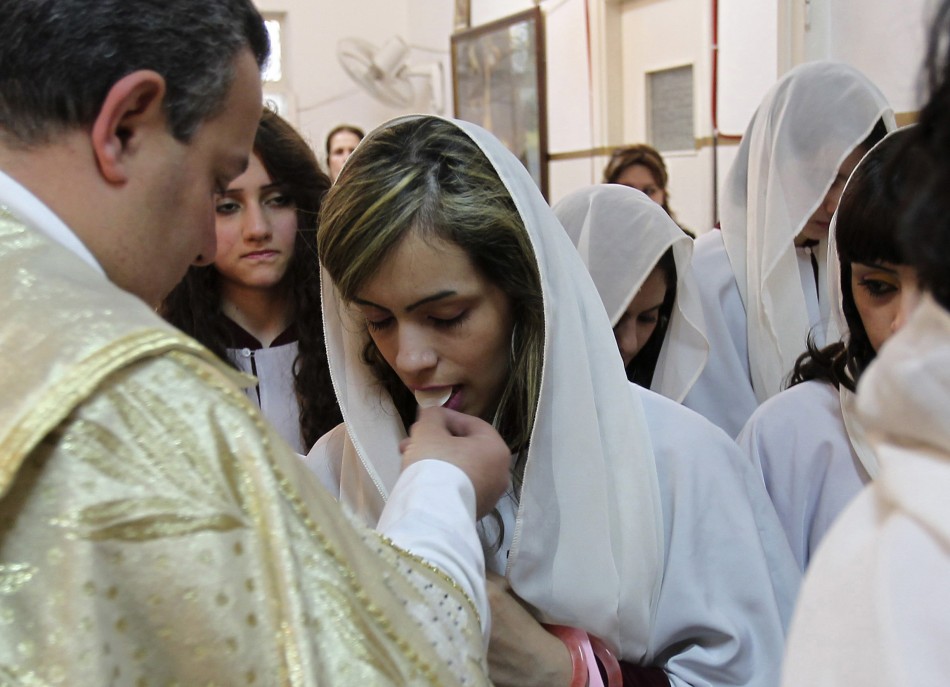 |
| Priest gives communion to an Iraqi woman |
Gospel of the day: Mt
8:5-13 The healing of the centurion’s
servant
Our Lord marvelled at the faith of the centurion who said he
was unworthy of such a guest as Jesus. What faith indeed this man must have had
for Jesus to have marvelled at this gentile soldier! The centurion was a
military commander of one hundred men. According to Luke’s account of this he
was responsible for building a synagogue. The witness of the Jewish people had
opened this gentile man’s heart to the truth. And before the Christ he stood
before the Holy God of Israel, though he did not know it fully; at least
intuitively he knew this man was different.
His words are familiar: “Lord, I am not worthy to have you
come under my roof; but only say the word, and my servant will be healed.” At
Mass we say: “Lord I am not worthy that you should come under my roof, but only
say the word, and my soul shall be healed.”
Our souls, like the centurion’s servant, need to be healed
by Christ. We inherit the consequences of Adam’s sin, and while our baptism has
absolved us of this original sin, God wills that we should still be subject to
its temporal consequences. We still have a tendency to sin. We find the sinful
way much easier than the virtuous way. Our souls are not yet fully reconciled
to God and thus need healing. Christ alone can heal us.
Christ comes to us as a guest in the most Holy Sacrament of
the Altar. He condescends to make the bread and wine of the Eucharist His most
sacred body and most precious blood, that we might welcome Him as a guest and
that we might be healed.
How do we approach our Lord Jesus Christ during Mass? Do we
approach with the faith of this centurion? Or do we take Him for granted? Do we
think it our right to receive the sacrament?
In this season of Advent let us cultivate a sense of the
sacred. Try to spend time before a sacred image or a crucifix adoring God and
thanking Him for His inestimable gift in the Incarnation and Redemption. Even
better try to spend some time before the Blessed Sacrament adoring Christ.
Sunday 30 November 2014
Advent Reflections filmed at Buckfast Abbey
ADVENT REFLECTIONS ON EWTN
Filmed at Buckfast Abbey and the School of the Annunciation.
1st Week of Advent: Repentance Is the Essence of Conversion
Abbot David Charlesworth, OSB, of Buckfast Abbey, speaks about the importance of personal conversion
as the means for getting ready for the coming of Christ.
Sunday, Nov 30 at 7:30, 15:30; Tuesday 2, 19:00; Thursday 4, 21:30 (30 mins)
2nd Week of Advent: Preparing to Welcome Christ
Dom Thomas Regan, OSB, of Buckfast Abbey, talks about the need to prepare well in order to properly celebrate Advent and Christmas, by putting Christ at the heart of Christmas.
Sunday 7, 7:30, 15:30; Tuesday 9, 19:00; Thursday 11, 21:30. (30 mins)
3rd Week of Advent: Rejoicing with Mary in the Coming of the Lord
Fr Guy Nicholls, of the Birmingham Oratory, invites us to prepare our hearts like Mary, to rejoice in the
coming of the Lord. Sunday 14, 07:30, 15:30; Tuesday 16, 19:00; Thursday 18, 21:30. (30 mins)
4th Week of Advent: Hope in the Word Made Flesh
Fr Ian Hellyer, of the Ordinariate, reflects that hope is at the heart of Advent, fulfilled ultimately in the Word made Flesh. Sunday 21, 07:30, 15:30; Tuesday 23, 19:00. (30 mins)
EWTN can be found on satellite TV and also watched live online: www.ewtn.co.uk
Saturday 22 November 2014
Christ the King
Buckfast Ordinariate Mission is joining Plymouth University Chaplaincy Mass at the Church of Christ the King in Plymouth, for their Mass of Feast of Title at 11.30am. There is a bring and share lunch party afterwards.
Monday 17 November 2014
The Destiny of Humanity: On the Meaning of Marriage | Part 1 of 6 of The Humanum Series
Today the Humanum colloquium got underway in Rome; the three-day gathering of scholars and religious leaders from numerous countries and faiths will focus on the theme “The Complementarity of Man and Woman.” Sponsored by the Vatican’s Congregation for the Doctrine of the Faith, the colloquium opened Monday morning with an address by Pope Francis (full text here). Other speakers scheduled for the coming days include Rabbi Jonathon Sacks, Sr. Prudence Allen, Dr. Russell Moore, N.T. Wright, Rick Warren, and Archbishop Charles Chaput, as well as Muslim, Hindu, Buddhist, and Sikh scholars and leaders.
The Humanum colloquium also features the premiere of six short films focusing on different aspects of marriage as the foundation for the family and for society. I recommend them to you.
Friday 14 November 2014
Advent Reflections on EWTN
The Eternal Word Television Network (EWTN) is a Catholic TV channel based in the US. It can be accessed by Satellite TV or a live stream on their website www.ewtn.com. The new School of the Annunciation, based at St Mary's Abbey, Buckfast, was invited to provide four priest to give addresses for each of the four weeks of Advent. The first is Abbot David who is well loved by many of us in Buckfast Ordinariate Group not least because he befriended us when we made our journey from the Church of England. Secondly Fr Tom is resident at the Abbey and well known for is lively and engaging style. Fr Guy Nicholls is an Oratorian Father and very well known for his calm and erudite delivery. The runt of the litter is the fourth offering from me, but my prayer is somehow it will help to highlight the Ordinariate's involvement with the School of the Annunciation.
The schedule:-
ADVENT REFLECTIONS
FIRST WEEK OF ADVENT: REPENTANCE IS THE ESSENCE OF CONVERSION
Abbot David Charlesworth, O.S.B. of Buckfast Abbey talks about the importance of personal conversion as the means for getting ready for the coming of Christ.
Sunday, 11/30 07:30 AM Sunday, 11/30 03:30 PM Tuesday, 12/02 07:00 PM Thursday, 12/04 09:30 PM
SECOND WEEK OF ADVENT: PREPARING TO WELCOME CHRIST
Fr. Thomas Regan, O.S.B. talks about the message on the need to prepare well in order to properly celebrate Advent and Christmas, by putting Christ at the heart of Christmas.
Sunday, 12/07 07:30 AM Sunday, 12/07 03:30 PM Tuesday, 12/09 07:00 PM Thursday, 12/11 09:30 PM
THIRD WEEK OF ADVENT: REJOICING WITH MARY IN THE COMING OF THE LORD
Fr. Guy Nicholls offers a meditation on the third Week of Advent, inviting us to prepare our hearts like Mary to rejoice in the coming of the Lord.
Sunday, 12/14 07:30 AM Sunday, 12/14 03:30 PM Tuesday, 12/16 07:00 PM Thursday, 12/18 09:30 PM
FOURTH WEEK OF ADVENT: HOPE IN THE WORD MADE FLESH
Fr. Ian Hellyer offers a reflection on the fourth week of Advent, witnessing that hope is at the heart of Advent, found ultimately in the Word made Flesh.
Sunday, 12/21 07:30 AM Sunday, 12/21 03:30 PM Tuesday, 12/23 07:00 PM
Thursday 13 November 2014
Esse et Amor (Being and Love)
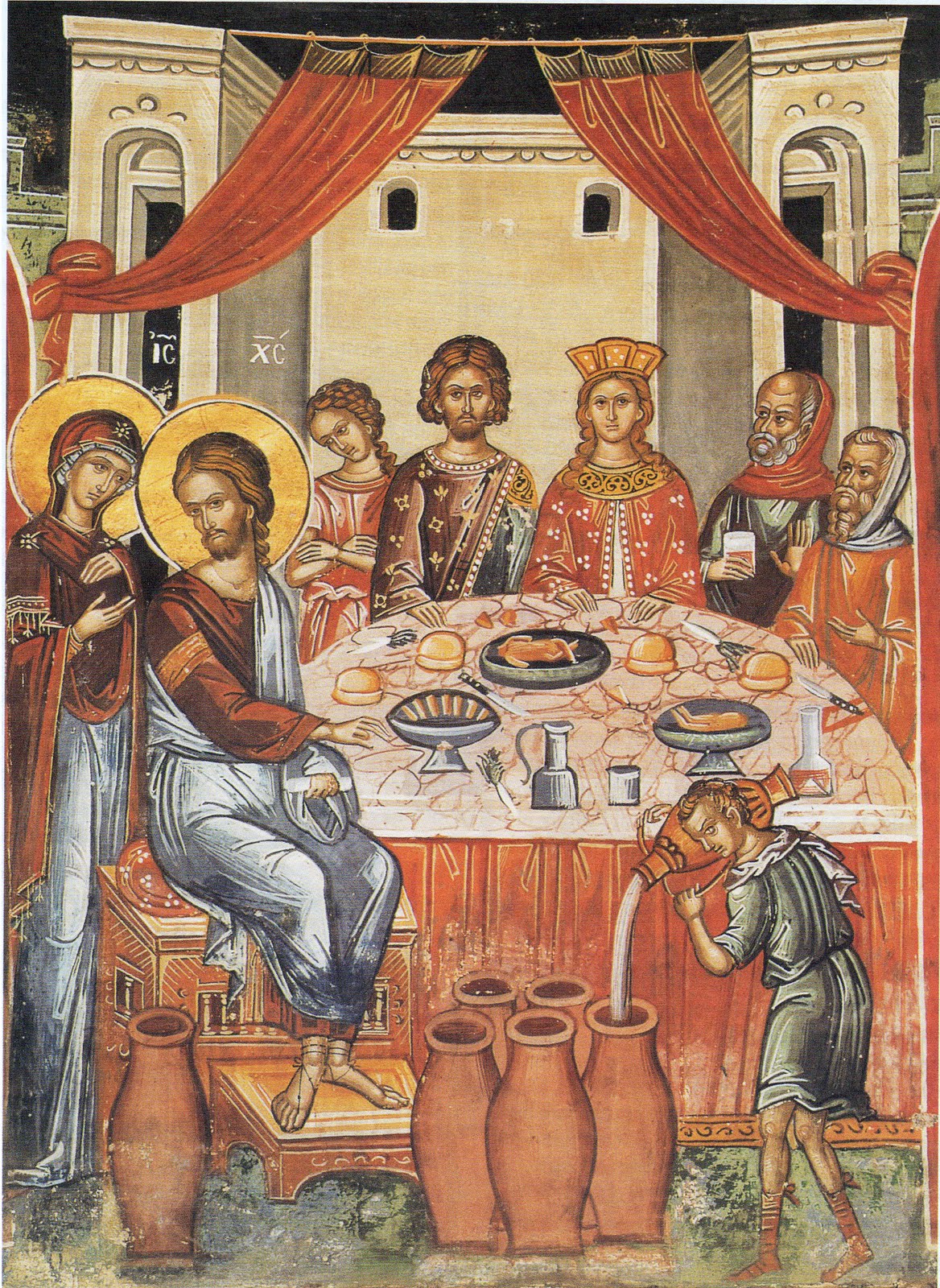 |
| The wedding in Cana |
The understanding of the human person as a creature of God and made in the image and likeness of God is a fundamental aspect of Catholic anthropology (the understanding of what it is to be a human being). Being made in the image of God affords the human person a dignity which is fulfilled in his calling to divine beatitude. He is not just an animal that responds to his natural inclinations but possesses a dignity pointing towards something that transcends those inclinations. As God is Trinity which ineffably expresses both Being and Love*, so the human person is called to find beatitude through both life and love, both body and soul. He is a creature of great capacity and potential. In his God-given freedom of will, the human person either does, or does not, conform to this great good that God has promised and is corroborated by his moral conscience. Catholic teaching on marriage and sexual ethics proclaims this great good. To separate the unitive from the procreative, which all forms of sexual immorality do in one way or another, is a sin against the inner life of the human person made in the image of God who is Trinity (Esse et Amor). To act as if these were separate is to go against God’s calling and is opposed to our dignity as made in the image of God.
Without an understanding of Catholic anthropology the foundational teaching of the Catholic Church on marriage and sexual ethics cannot be understood. While of course someone may choose to accept the authority of the Church, they will not understand why the Church proclaims what she does. When the Church’s teaching is challenged, how can someone make a reasonable defence of their chosen behaviour? The proclamation that the two inseparable goods of marriage and sex are the unitive and the procreative, informs all the Church’s teaching on marriage and sexual ethics. Every form of sexual immorality is opposed to this integrity of the unitive and procreative. Understanding Catholic anthropology, that human beings are made in God’s image and called to Beatitude, is fundamental because the inseparable goods of marriage and sex (unitive and procreative) are reflections of God Himself who is revealed as Being and Love (Esse et Amor).
IH
Sunday 9 November 2014
Why celebrate the feast of a building?

Dedication
of the Basilica of St John Lateran
Today is the feast of the dedication of the Basilica
of St John Lateran. So perhaps we should ask why do we commemorate the
dedication of a church building, and one that happened in fourth-century Rome? For us in the Ordinariate it is probably a
feast that we were not used to celebrating as Anglicans.
So why? First, because St. John Lateran is no
ordinary church—it’s the cathedral church of the Pope and still known as “the
mother of all the world’s churches.” It is dedicated to Christ our Saviour and
Saint John the Baptist and St John the Evangelist. It is the place where the
Pope’s Cathedra is housed – the chair
which represents his authority given to him by Christ. It is the oldest of the
papal basilicas and it is, I believe, the oldest church in the West –
consecrated in 324 AD.
So one of the things this feast points to is the
unity we all enjoy together as Catholics. Catholics are found all over the
world, from many nations, from many different cultures, from many different
language groups, all with our local customs and traditions. But we are all
united by one Faith and one Baptism and all recognise the authority and
unifying importance given by our Lord to the Apostle Peter. So this feast also
reminds us of the common respect we Catholics have for the Pope, who is the
successor of St Peter, the Rock of the Church.
But more than that, because God has from all time
intended the church building to be a symbol of His Church and our bodies. This
is what the readings for today’s feast invite us to consider. God’s prototype
for the church is the Jerusalem Temple, described in this week’s First Reading
and Psalm. It is God’s “holy dwelling,” site of His presence in our midst,
source of “living waters”—of all life and blessing.
There is a tendency today for people to say that
Church buildings do not really matter that much. They are just convenient
places to assemble for collective worship. And people will also add that it
would be better to spend surplus cash on the poor rather than spend it on fancy
buildings. This way of thinking is understandable on the surface, but scratch
it a little deeper and we find the argument crumbles.
This way of thinking largely since the 1960s has
been fashionable and has seen Catholic churches being built that are very
functional, bare and unadorned. Paradoxically while spending on church
architecture has decreased, spending on people’s own homes has increased. Our
own residences have become more and more luxuriously kitted out, but Catholic
church’s over the time became more and more spartan and cheaply made. St John
Vianney was a great example to us, he never neglected the poor, but neither did
he neglect his church, the vestments and the holy vessels of the altar. His
home consisted of a simple chair and table, very little else. But delighted
spend what money he had on beautiful chalices and vestments to honour Our Lord,
while not neglecting honouring the Lord through supporting the poor.
Churches are reflections of the heavenly city where
the eternal and perfect worship of God takes place by Angels and Saints; and we
in the Mass participate in this heavenly liturgy which is going on in heaven.
Our worship is imperfect, yet we, by grace, participate in this heavenly
liturgy. Churches should then lift our hearts to think of heaven – they should
not be mere functional buildings. They should be places of beauty and through
symbolism point to the divine truth.
The Temple was the prototype for the Church building
symbolising the “dwelling place of God Himself”. Our Church buildings are also
the dwelling place of God as they house the tabernacle where our Saviour Jesus
Christ is truly present under the sign of bread.
But some will say, didn’t our Saviour say He would
tear down the Temple and rebuild it in three days – not replacing it with
another building but His own Body in the Resurrection? Indeed that is the case,
but that does not mean Church buildings are not needed or not important, but
that they have a deeper meaning.
God intended the Temple to give way to the Body of
Christ. That’s what our Lord’s words and actions in today’s Gospel are intended
to dramatize. Christ’s Body is now the dwelling of God’s “glory” among us (see
John 1:14). It’s the new source of living waters (John 4:10,14; 7:37-39;
19:34), the living bread (John 6:51), the new sanctuary where people will
worship in Spirit and truth (John 4:21,23). By Baptism, we are joined to His
Body in the Church (see 1 Corinthians 12:13).
The Church building points us to Christ’s Body, His
living Temple, which is the whole Church, the Body of Christ. In our Epistle today,
it says the Spirit of God comes to dwell in us and makes us “God’s building…the
temple of God” (see also 1 Corinthians 6:9). So in a way it is the other way
round. We, the Body of Christ, members of the Church are to be made into God’s
building! But how can we imagine what
that is if we have no inspiring buildings?
Jesus drove out the sellers of oxen, sheep and
doves, signalling an end to the animal sacrifices that formed the worship of
the old Temple. In the spiritual worship of the new Temple, we offer our
bodies—our whole beings—as a living sacrifice (see Romans 12:1). Like living
stones (see 1 Peter 2:5) built on the cornerstone of Christ (see Mark 12:10;
Acts 4:11), together we are called to build up the new Temple of God, the
Church.
There is a connection between our attitudes towards
Church buildings, and our attitudes towards the Temple of our bodies, and also
the Church as the Body of Christ. It cannot be too surprising that if our
approach to these earthly Church buildings is very functional, then the way we
treat one another starts becoming functional too. The temptation of thinking of
others in terms of function only is very common in our time. People think of
their bodies not as temples of the Holy Spirit, but as a biological machine to perform
various functions for us, but equally something that can be disposed of when no
longer useful.
It is also connected to the way we think of the
Church – it very common to find Catholics talking about the Church as if it
were merely a human institution that performs certain functions but which can
be changed if we want it to do something differently.
This functionalist approach is not holy. God our
Maker has given us our bodies not merely as functional machines, they are part
of the gift of our being made in the image of God. Our outward bodies are fully
united with our souls. What we do with our bodies will affect our souls. The
two are one, just as Christ’s two natures, divine and human, are fully
one. Our bodies are sacred and imbued
with a sacred dignity that cannot be taken away. And the Church too is no mere
functional organisation; the Church is the mystical Body of Christ – it too is
both visible and invisible, both human and divine. All these things are beautifully connected
together – this is why when we enter a beautiful Church which is configured to
the truth divinely revealed to us, that our hearts are lifted to the Lord. We
sense His Presence and we fall in adoration before Him. In that moment of
adoration we become what God wants us to be, we are united to the Communion of
Saints in heaven and to the countless hosts of Angels.
But lastly, as the Jerusalem Temple was, so the
Church will always be: under construction—until at last it is perfected in the New
Jerusalem, our mother Church, come down from heaven. So yes our bodies are not
perfect and won’t be until the Day of Resurrection. So the Church is not
perfect either and won’t be until the end of time. Nevertheless we look forward
in hope to our coming Saviour Jesus Christ, knowing that by the Holy Spirit,
and through His Grace, we are being made into the living Temple of His Glory.
AMEN. IH Nov 2014
Tuesday 14 October 2014
Thoughts about the family during this time of the extraordinary synod
As we approached the beginning of the time of the Extraordinary Synod in Rome I was mindful of Pope Benedict's counsel about Vatican II: that there was a council of the media, and there was the real council. One cannot fail to appreciate the truth of this especially as a convert, for one encounters more and more Catholics who say, "well that changed at vatican ii" but who haven't actually ever read any document of Vatican II! So I have taken with a pinch of salt most of the reports we have received about this synod. I am waiting for the true result of the Synod, which of course won't be produced until part 2 of the synod has happened next year.
I have however read about the press conference with 3 Cardinals and an Archbishop here and share, if it is an accurate representation, disappointment at an opportunity lost. We desperately need our Shepherds to proclaim with confidence to the world the good news of Catholic teaching on marriage and sex. They should not be reticent about this. But I sometimes wonder if they know that Catholic teaching is indeed good news.
I entered the full Communion of the Catholic Church only a few years ago. Part of my relief in making the journey from being an Anglican clergyman to being a pastor of the Catholic Church was that at last the truth that I wanted to proclaim in my preaching and teaching about marriage, family and sex would be the teaching of the Church in which I was ministering. That prospect filled me with joy.
As an Anglican clergyman whenever I spoke about abortion, marriage, family size, population etc I would frequently be greeted with scepticism or outright opposition, and most of the time, a silence that spoke loudest of all. Rarely would I find support. What I found in the Catechism of the Catholic Church was an affirmation of what my wife and I had tried to live in our marriage, and I looked forward to being in full communion with the Church which had produced that Catechism.
Despite the ridicule, the 'jokes', and the embarrassment we obviously caused people, my wife and I have come to believe that the teaching of the Church regarding marriage and sexual morality is actually good news. Yet when expressing this belief amongst Catholics, including groups of Catholic clergy, too often I find people who are not so sure. There is a lack of confidence.
Only recently I spoke with a priest who essentially was trying to say we ought not to "burden" people with this teaching too much. My response was, "Well if you teach it as if it is merely a set of commandments, 'don't do that...' then of course it will come across as a burden. But we have the Catechesis of St John Paul on the Theology of the Body - we do not have to teach it merely as a set of commands." I went on to spell out why our culture is a culture of death and in part is because we have failed to proclaim the good news of the Catholic vision of marriage, family and sex. As a university chaplain I see some of the effects of this in the young men and women I try to offer pastoral care to. Whether it is the corruption of men's hearts because of a long-term use of pornography and masturbation, or women who have had multiple abortions; in every direction we see the terrible effects of a culture of death. What people need is the confident and joyful proclamation of the culture of life. The priest I spoke to was shocked. He had not thought about it in quite that way!
The Church has the treasure of the truth revealed by God for our salvation, and it is very good news - this includes the treasure of its teaching about marriage and about the most intimate part of marriage life, sex. This teaching is very, very good news! The Church needs to find those with a voice to proclaim this good news - perhaps this should not necessarily be cardinals and archbishops.
One of the most joyful experiences I have had in the Catholic Church has been on a campsite! For the last two years we have taken part in a camp for Catholic home-schooling families. It has been a very great privilege to offer mass at the home-schooler's camp. It is on such occasions that one can appreciate the very great joy of the Catholic vision for the family. Yes it is very hard work. Yes it means one has to renounce a lot of things for oneself. But isn't that the essence of caritas, of Christian love? Perhaps we home-schoolers should invite along some of our bishops and priests to see it too?
Sometimes I am referred to as Father Quiverfull! I don't mind. For Holy Scripture says, "Blessed is the man who has his quiver full of them!" The Lord has truly blessed me with ten children. And I am very blessed to have discovered the very good news of the teaching of Holy Mother Church.
My prayer is that the Church will find the voice to speak this good news confidently and joyfully.
Fr Ian
Subscribe to:
Posts (Atom)
-
An Examination of Conscience for Lent reflecting on Christ’s Suffering and Passion on the Cross by Fr Dylan James “The Cross ex...
-
Reflections on the theme of Worship through reflecting on the sacrifices of the Old Testament: Introduction Sacrifice of Abel Sacrifice of ...
-
The offerings of Cain and Abel to God, in Genesis 4, come as one of the first acts the children of Adam and Eve perform. They make a sacri...








